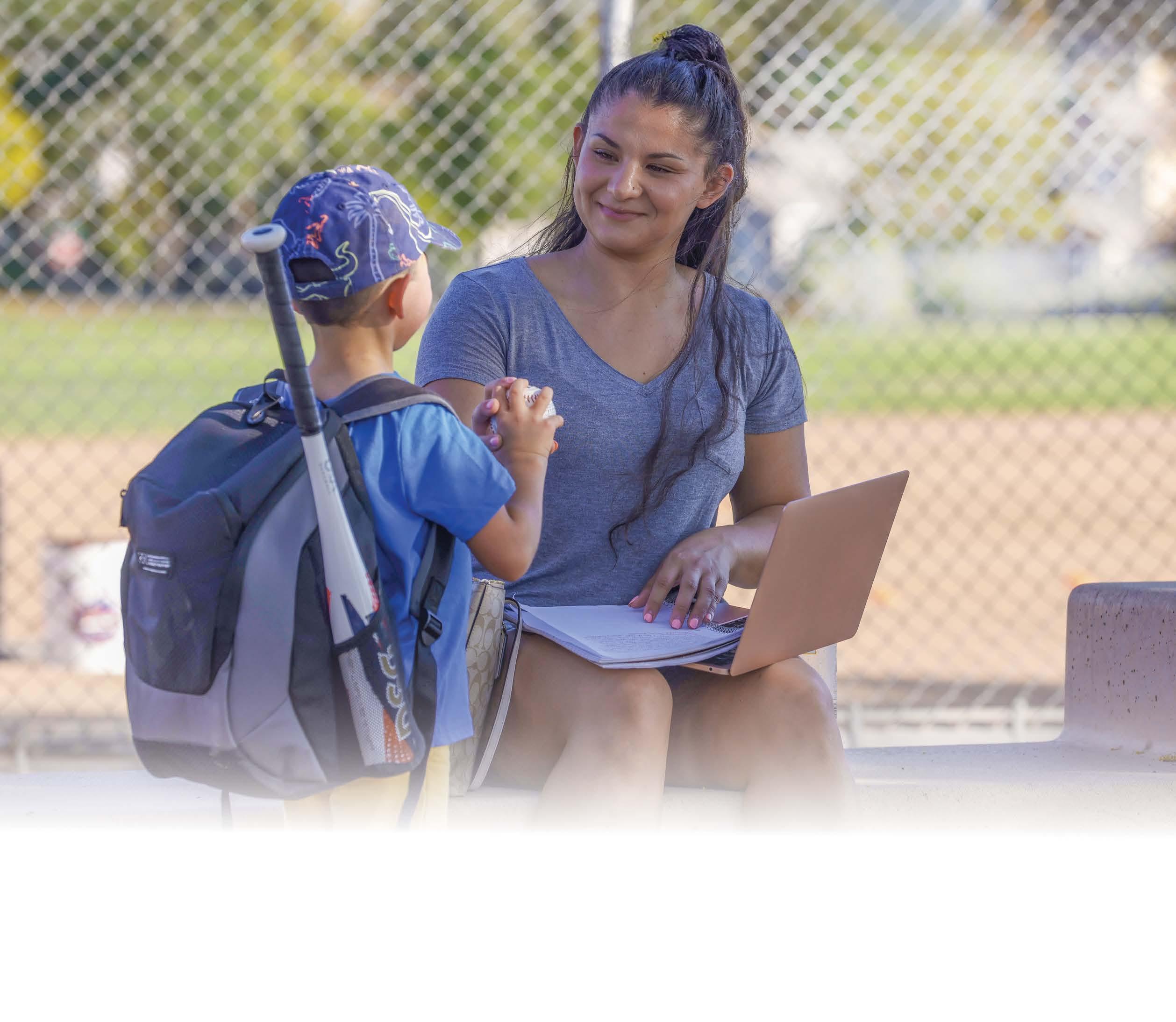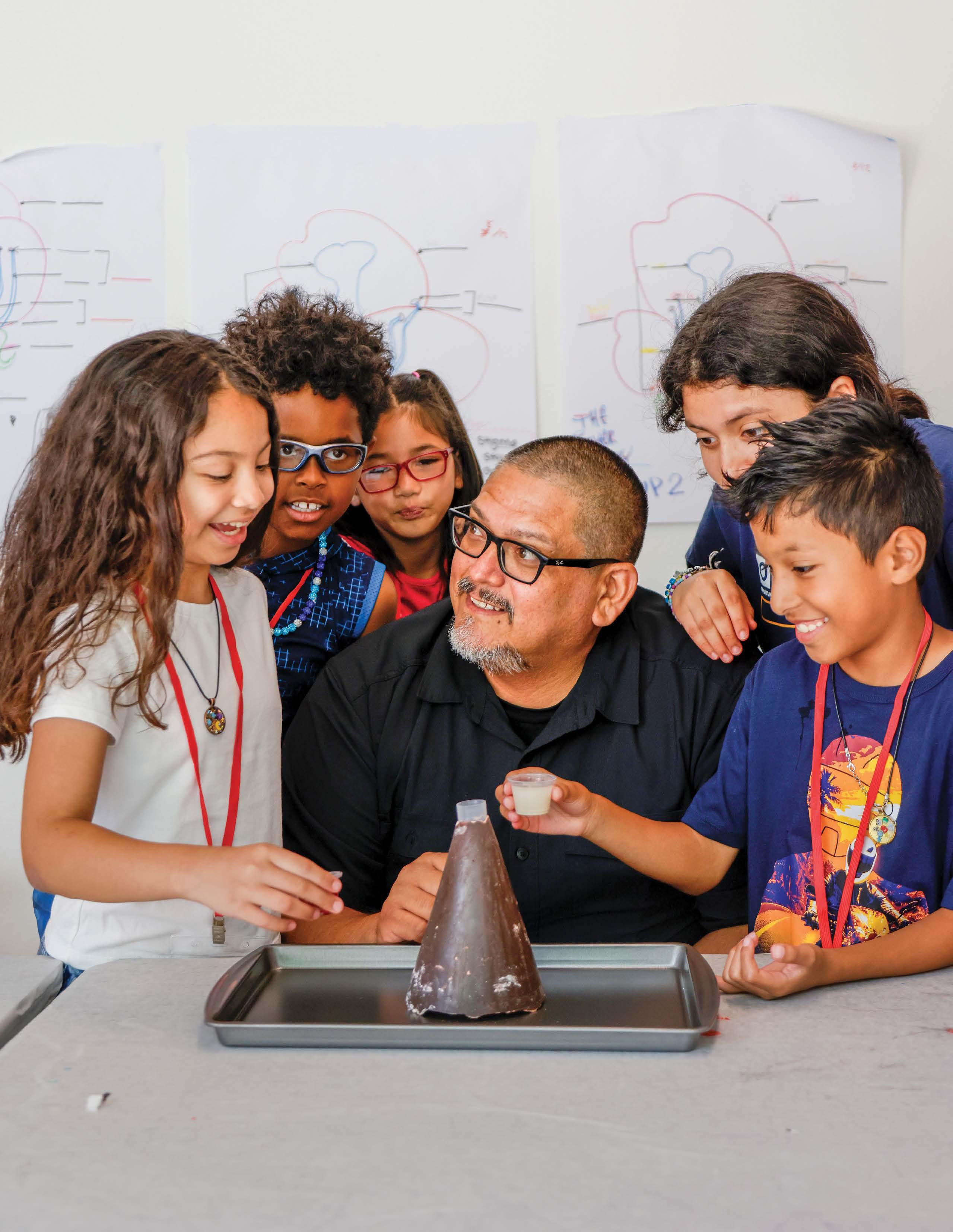

SDCCD WITH
EXCELLENCE
BOARD OF TRUSTEES
Geysil Arroyo
Mariah Jameson
Marichu Magaña, Psy.D.
Craig Milgrim
Maria Nieto Senour, Ph.D.
CHANCELLOR
Gregory Smith
PRESIDENTS
Ricky Shabazz, Ed.D.
Ashanti T. Hands, Ed.D.
P. Wesley Lundburg, Ph.D.
Tina M. King, Ed.D.
EXECUTIVE EDITOR
Jack Beresford
Vice Chancellor, Marketing, Communications & Public Affairs
EDITOR
Leslie Stump
Manager of Creative Services
GRAPHIC DESIGN
Gloria Orbegozo
PHOTOGRAPHY
David Brooks, Howard Lipin, Remo Sagastume
CONTRIBUTORS
Campus Information Officers: Cesar Gumapas, Anabell Pulido, Stephen Quis, Brenna Leon Sandeford
Writers: Allura Garis, Anne Krueger, David Ogul, Hoa Sanchez
San Diego Community College District
Marketing, Communications & Public Affairs Office
3375 Camino del Rio South, Suite 335 San Diego, CA 92108
The San Diego Community College District (SDCCD) is governed by its Board of Trustees. No oral or written representation is binding on the San Diego Community College District without the express written approval of the Board of Trustees.
Questions, comments, or story ideas? We’d love to hear from you. Email us mcpa@sdccd.edu
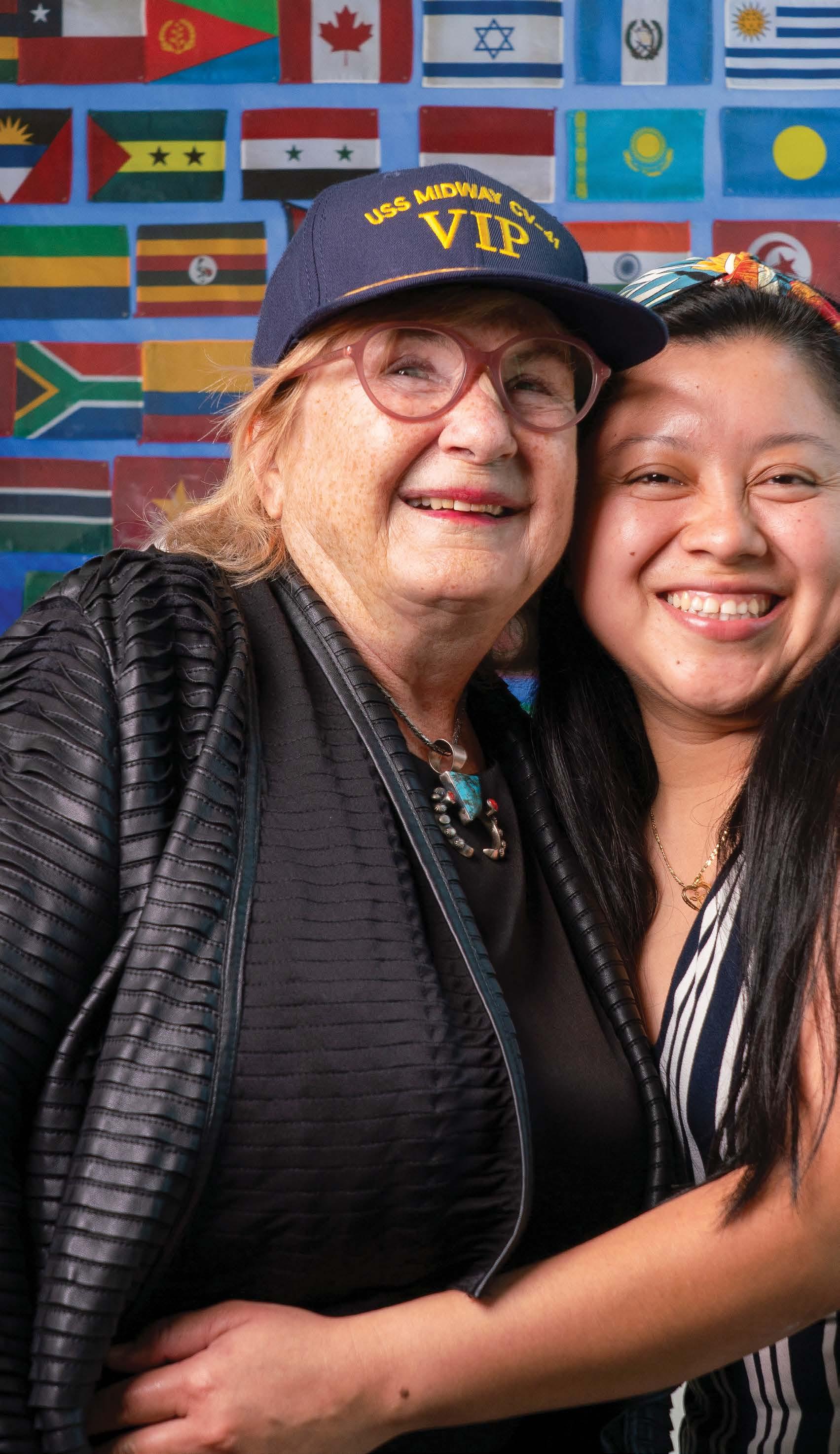
Supporting the dream
At SDCCE, students find more than a path to citizenship — they find a community of encouragement, a place to be themselves

08 Belonging through STEM
Personal transformation is at the heart of Beto Vasquez’s work in community outreach
16 Building spaces of unity
Thoughtfully designed collaboratives provide support, connection for greater student success
18 Belonging in action
Community college gave SDCCD retiree Rusty Krumm a sense of purpose that he paid forward
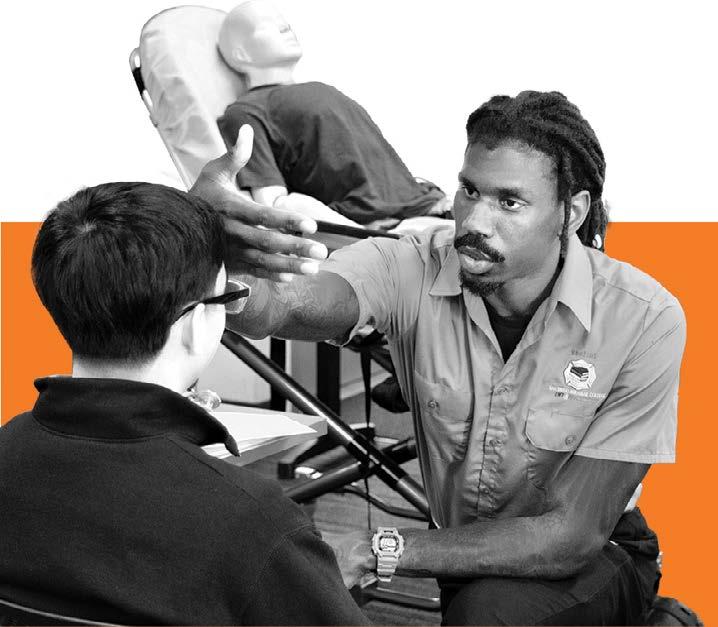
20 Rising to
serve
Miramar College’s new Public Safety Management bachelor's degree empowers students to become leaders in their communities
Every story begins with Be.
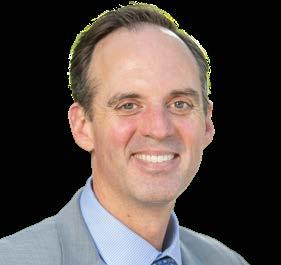
THIS YEAR, WE WILL SERVE 90,000 students across our four colleges — San Diego City, Mesa, Miramar, and Continuing Education. Each of those learners, and the hundreds of thousands of San Diego Community College District alumni in our communities, has a powerful story of hope and courage that guided where they started, where they have arrived, and where they will go next.
Last fall, the SDCCD launched its first-ever tagline alongside a refreshed logo and brand identity: Be. Belong. Become. This simple yet powerful phrase captures the essence of who we are and what we strive to offer every person who walks through our doors.
To Be means you are welcome just as you are. You don’t need to fit a mold. You don’t need to have it all figured out. You simply need to show up — and you’ll be seen, heard, and valued.
To Belong means you’ll find connection. Our colleges are communities where learners, faculty, classified professionals, administrators, and partners work together to create spaces for support, inclusion, and success. We are intentional about building environments where everyone knows they matter.
And to Become is the promise we make to every learner: your goals, your dreams, and your future are within reach. Whether you’re here to earn a degree, learn a new skill, change careers, or change your life, we are here to invest in your success.
In this special edition of WE magazine, you’ll see a fresh design that reflects our new brand — and more importantly, you’ll find stories that reflect our values. These are stories of transformation, resilience, and hope. They are stories of people who chose to Be, found where they Belong, and are on their way to Becoming.
Take in their journeys, see yourself in their reflections, and imagine what’s possible for you — and for all of us — when we live in the spirit of Be. Belong. Become.

GREGORY SMITH CHANCELLOR
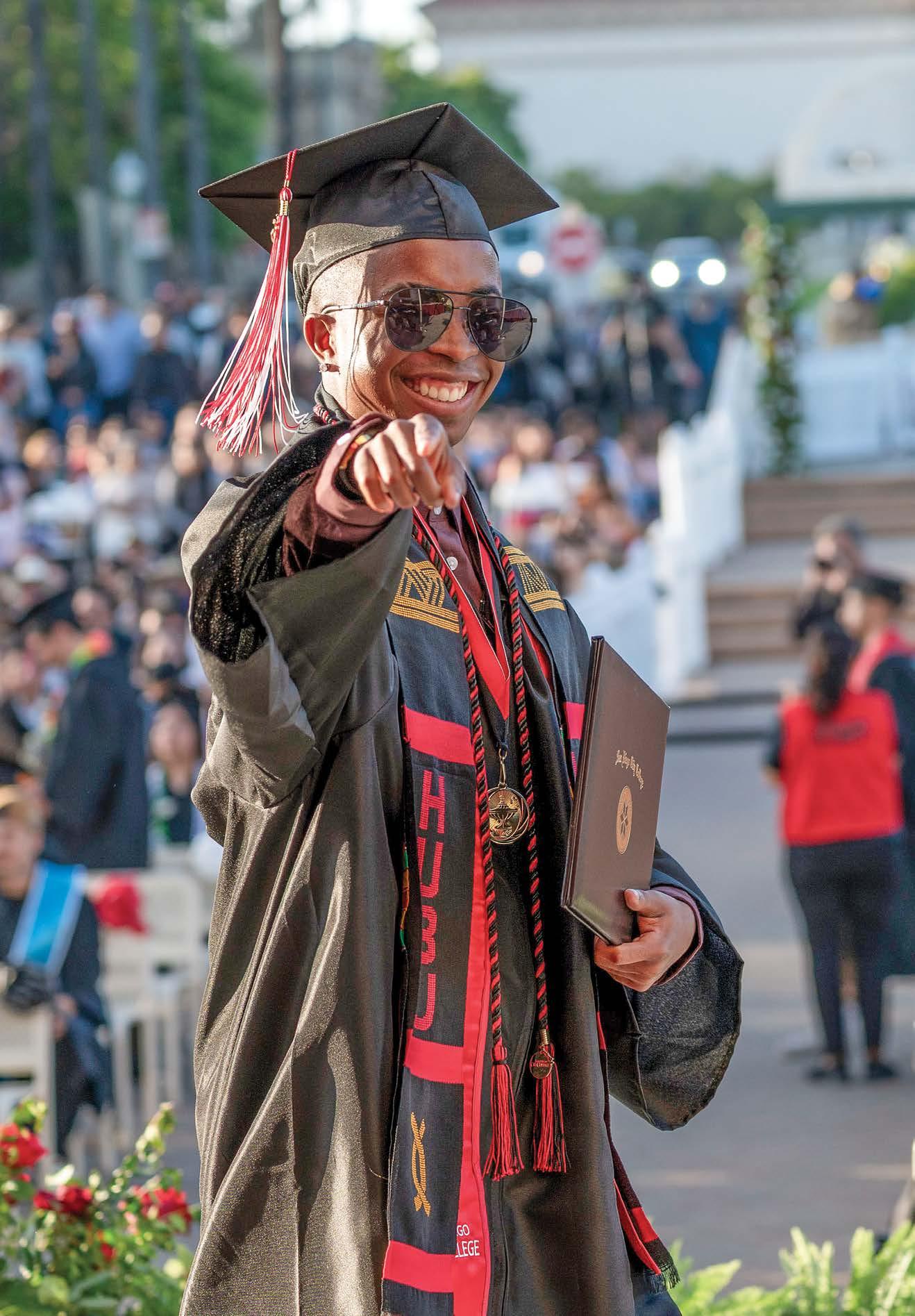
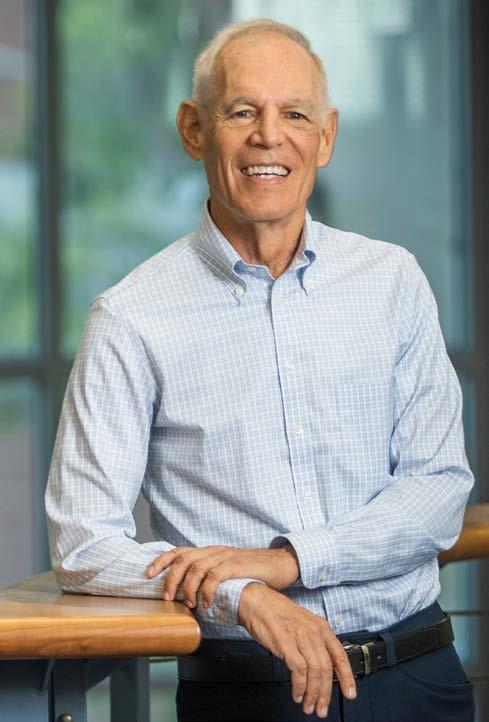
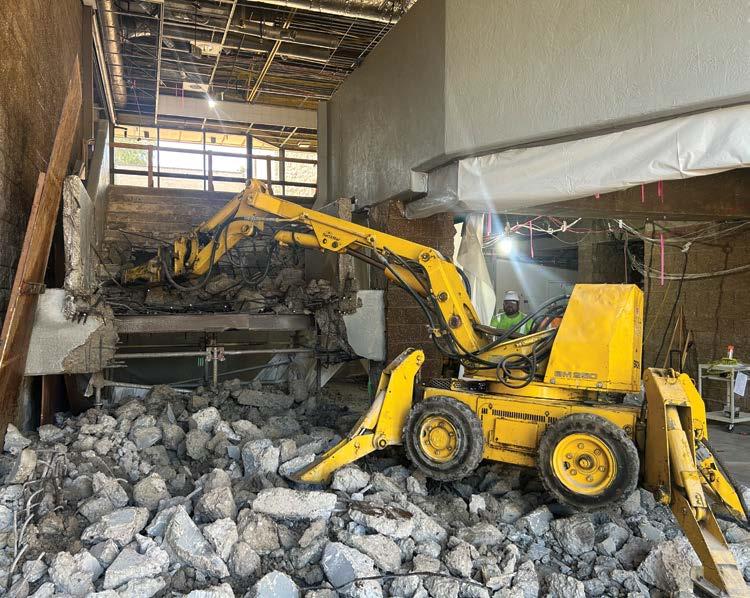

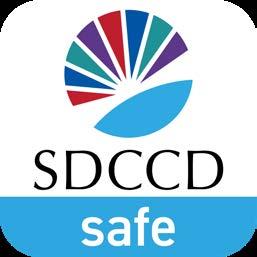

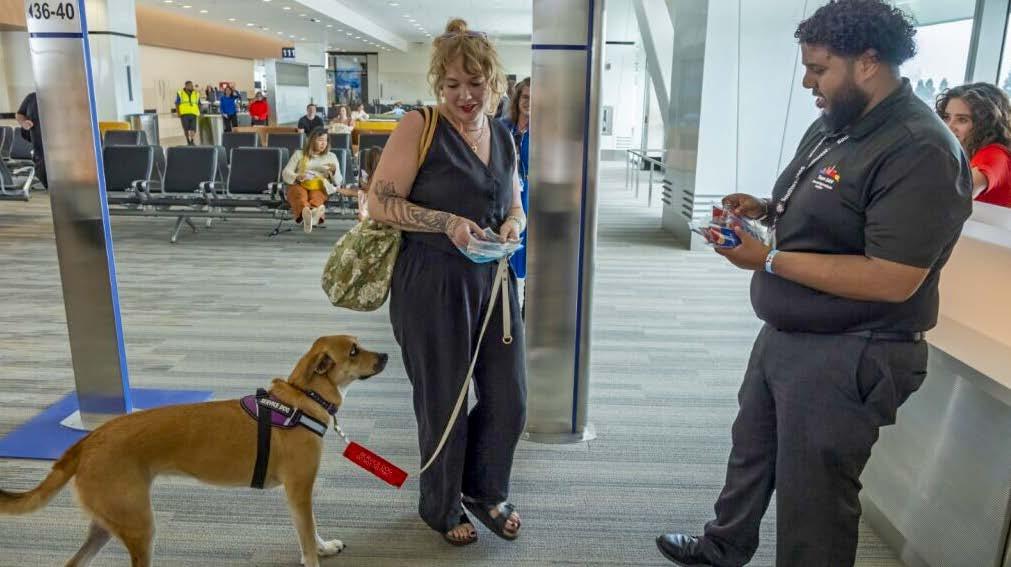
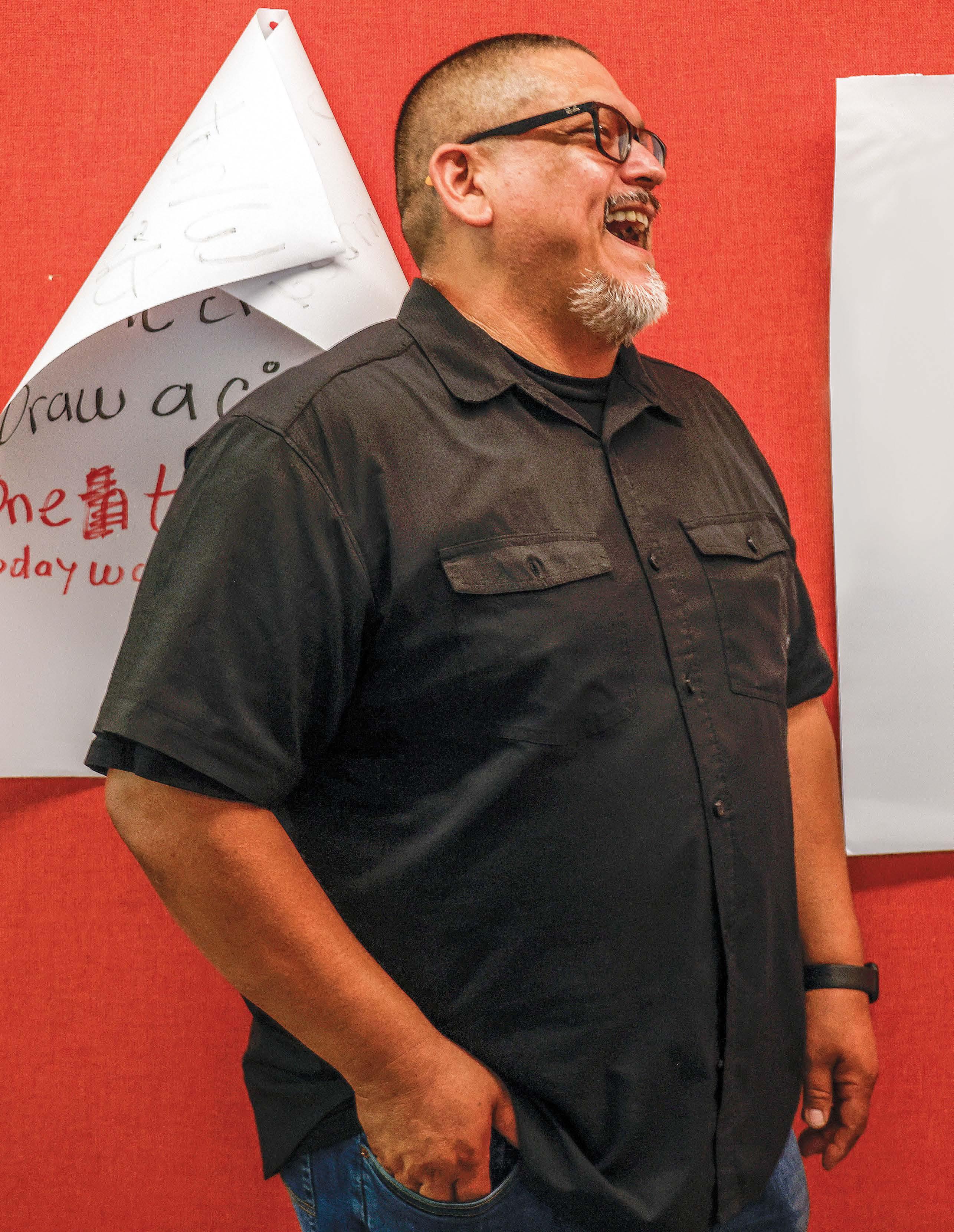
challenges and
to
in underserved communities,
By overcoming life
giving back
youth
City College alumnus Beto Vasquez epitomizes the spirit of SDCCD.
STORY BY DAVID OGUL
PHOTOGRAPHY BY DAVID BROOKS
BELONGING STEM
THROUGH

PERSONAL TRANSFORMATION IS AT THE HEART OF BETO VASQUEZ’S WORK IN COMMUNITY OUTREACH
IF YOU’RE SEARCHING FOR SOMEONE WHO EXEMPLIFIES THE SAN Diego Community College District’s new tagline, “Be. Belong. Become.”, look no further than Alberto “Beto” Vasquez.
Be. Vasquez, who spent many of his first 30 years in juvenile hall, jail, or prison, confronted his past when he arrived at San Diego City College in 2007 determined to build a better life through higher education.
Belong. Though often feeling out of place as an older, first-generation student, he immersed himself in programs such as the City College Math, Engineering, Science Achievement (MESA) program and Extended Opportunity Programs and Services, and student government — eagerly seeking out advice from counselors, instructors, and administrators.
Become. After earning two associate degrees from City College, Vasquez transferred to UC San Diego, completing both bachelor’s and master’s degrees in biology and later earned a Doctor of Education degree from San Diego State. He engaged community and students through Outreach Services at San Diego College of Continuing Education and, for the past eight years, has served as director of STEM Outreach and Community Engagement with UC San Diego CREATE (Center for Research on Education, Assessment and Teaching Excellence) promoting higher education and science, technology, engineering, and math pathways for underrepresented youth.
Vasquez is a man on a mission.
“We’ve had a lack of representation in the science workforce for decades,” Vasquez said. “It hasn’t changed much, even though STEM has become one of the fastest growing industries. We’re still essentially in the same place. So, I think we need innovation in our approach. We need different thought partners. We need to encourage folks about how to work together genuinely. And we can start by building small collaborations, like we’re doing here.”
The “here” is in the community room of the Keeler Court Apartments, operated by Community Housing Works in the southeastern San Diego neighborhood of Southcrest. The initiative, a collaboration between Community Housing Works, UC San Diego CREATE, San Diego Unified School District’s Level Up SD program, and San Diego Foundation, brings together resources to support STEM camps designed to spark a love of math and science in K-12 students.
BRINGING IT HOME
This summer, Keeler Court Apartments — a 15-minute walk from College of Continuing Education’s Educational Cultural Complex — hosted two, one-week STEM camps for 80 elementary school students who spent nearly eight hours daily exploring everything from the science of corn tortillas to volcanic eruptions without grades or pressure.
“We try to make science approachable, friendly, and fun, and getting the kids to want to learn,” Vasquez said.
Every seat in the bustling community room is filled. Older students, graduates of earlier CREATE outreach, serve as tutors, offering support and celebrating each child’s accomplishments. Vasquez recently got word that a former participant and tutor had been accepted to Princeton University.
“These kids have been doing science and math all their life, they just didn’t know it was science and math,” Vasquez said. “So, we show them, and suddenly they’re not intimidated anymore.”
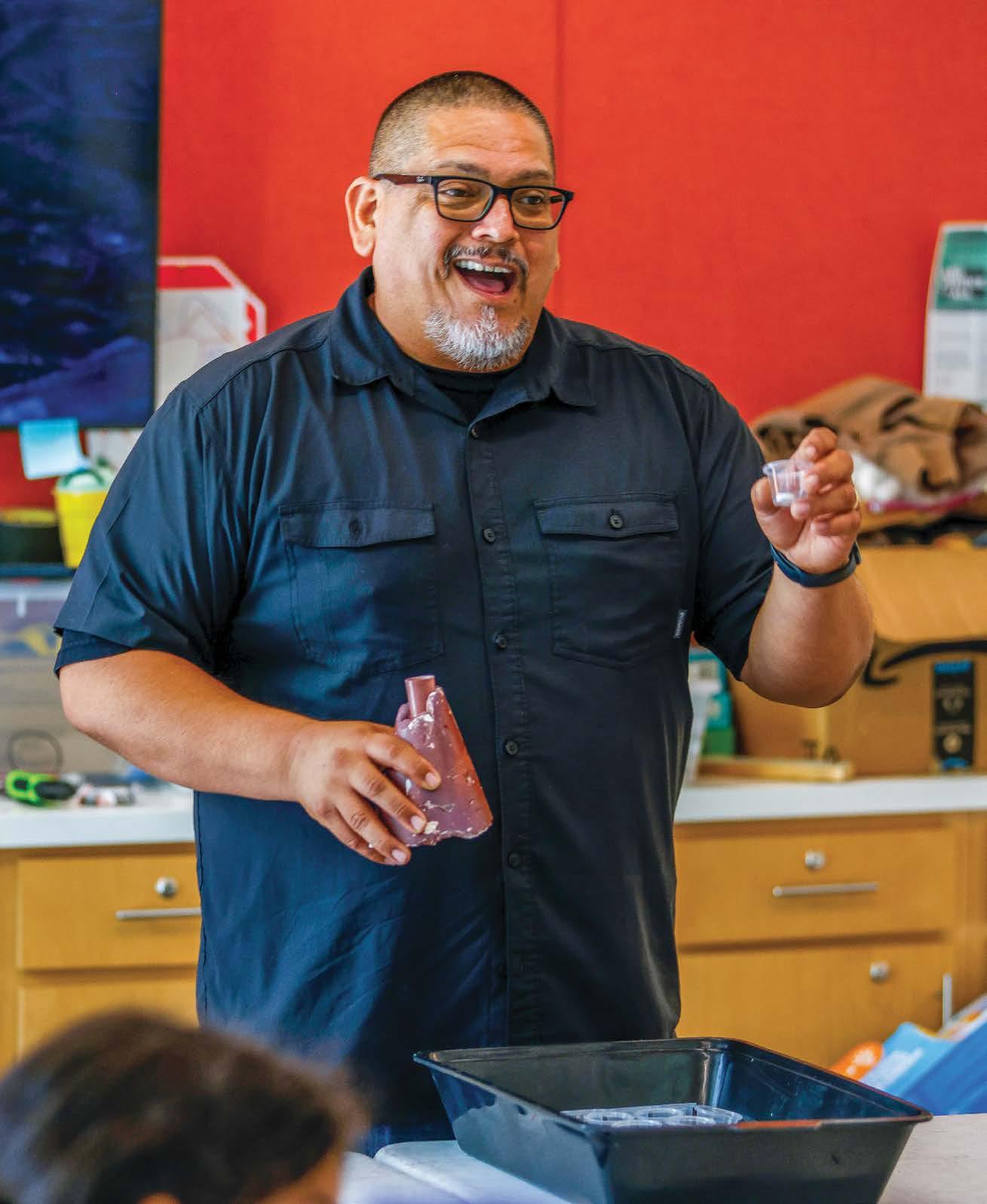

WHO Alberto “Beto” Vasquez
WHAT
San Diego City College alumnus, doctor of education, former San Diego College of Continuing Education employee, and current director of STEM Outreach and Community Engagement with UC San Diego’s CREATE
HOW Vasquez shapes his approach to STEM outreach by making it communitydriven, inclusive, and accessible.
Said Susan Yonezawa, executive director at CREATE: “Dr. Vasquez is an innovative and passionate leader in the UC San Diego STEM Education space who has single-handedly transformed UC San Diego CREATE’s footprint in K-12 STEM student- and community-facing education by crafting new inclusive programming for students in the southeastern San Diego community and, notably, blending the learning of scientific and engineering concepts with the uplifting of inclusive, indigenous, and cultural histories of those he aims to serve.”
Take the tortilla. A favorite lesson details how the corn tortilla was millennia in the making. It evolved from teosinte, a wild grass native to southern Mexico, where farmers some 9,000 years ago began selectively breeding for higher yields, eventually creating the modern maize in the production of today’s corn tortillas.
“Ultimately they’re modifying the genetics for a preferred characteristic,” Vasquez explained. “Happened with dog breeds; happens with a lot of different things.”
HAVING AN IMPACT
It’s hard to have a conversation with Vasquez and not come away impressed.
“I truly believe that Beto’s superpower is his ability to connect with people, regardless of circumstance, and to motivate them to achieve their goals,” said Denise Whisenhunt, a respected educator and longtime mentor now serving as president of Fresno City College, who met Vasquez when she was working as dean of Student Affairs at San Diego City College. “I have seen countless examples of where he brought people from the streets to campus who have been previously incarcerated or have faced some other hardship and supported them in their academic pursuits. He is a natural born leader, and students, regardless of where they have come from, respect him.”
A nephew, Xavier Vasquez, 32, is one of many inspired by Beto’s support.
“I had no plans on going back to school,” he said. “I was a single father just trying to raise my boys. While working
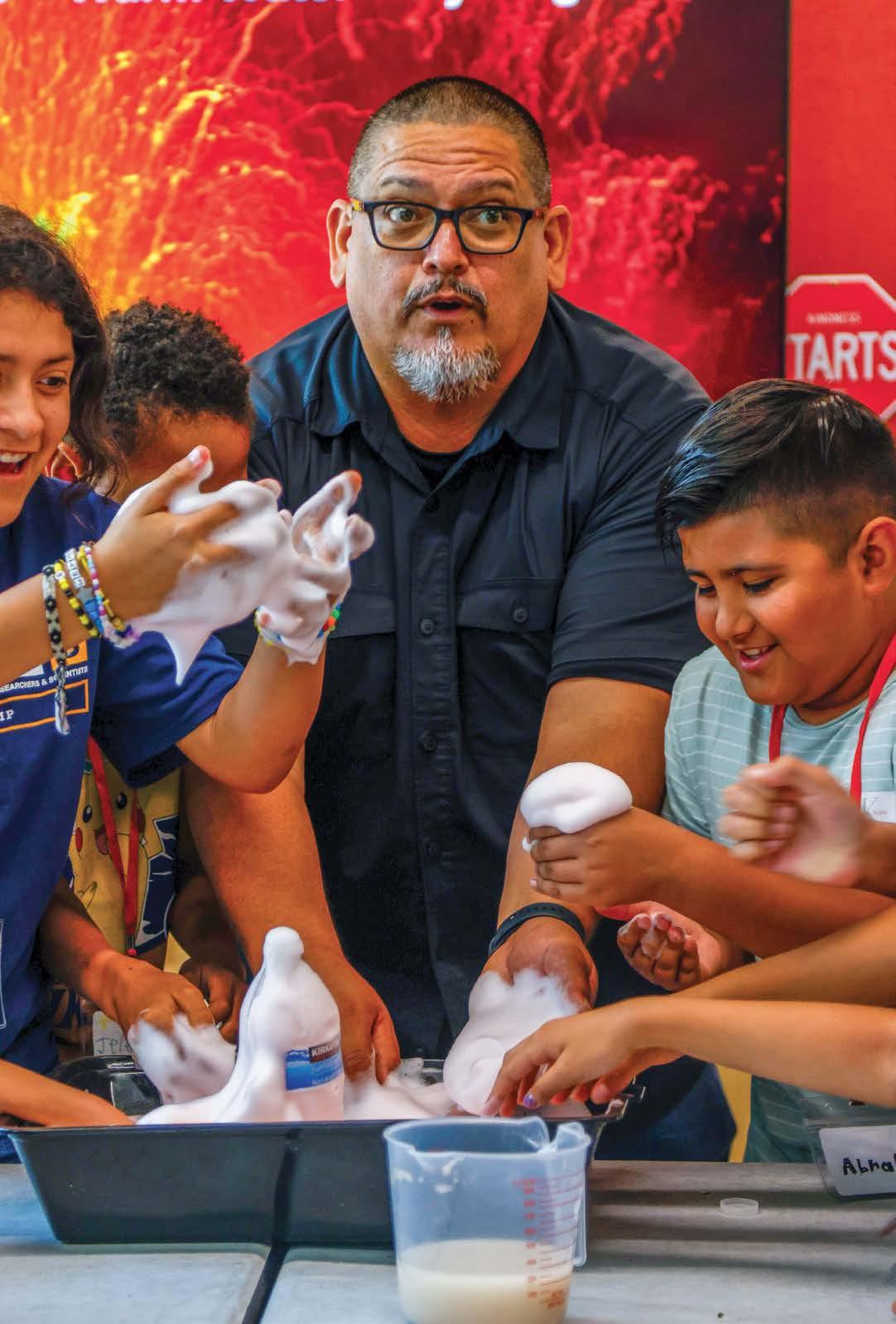
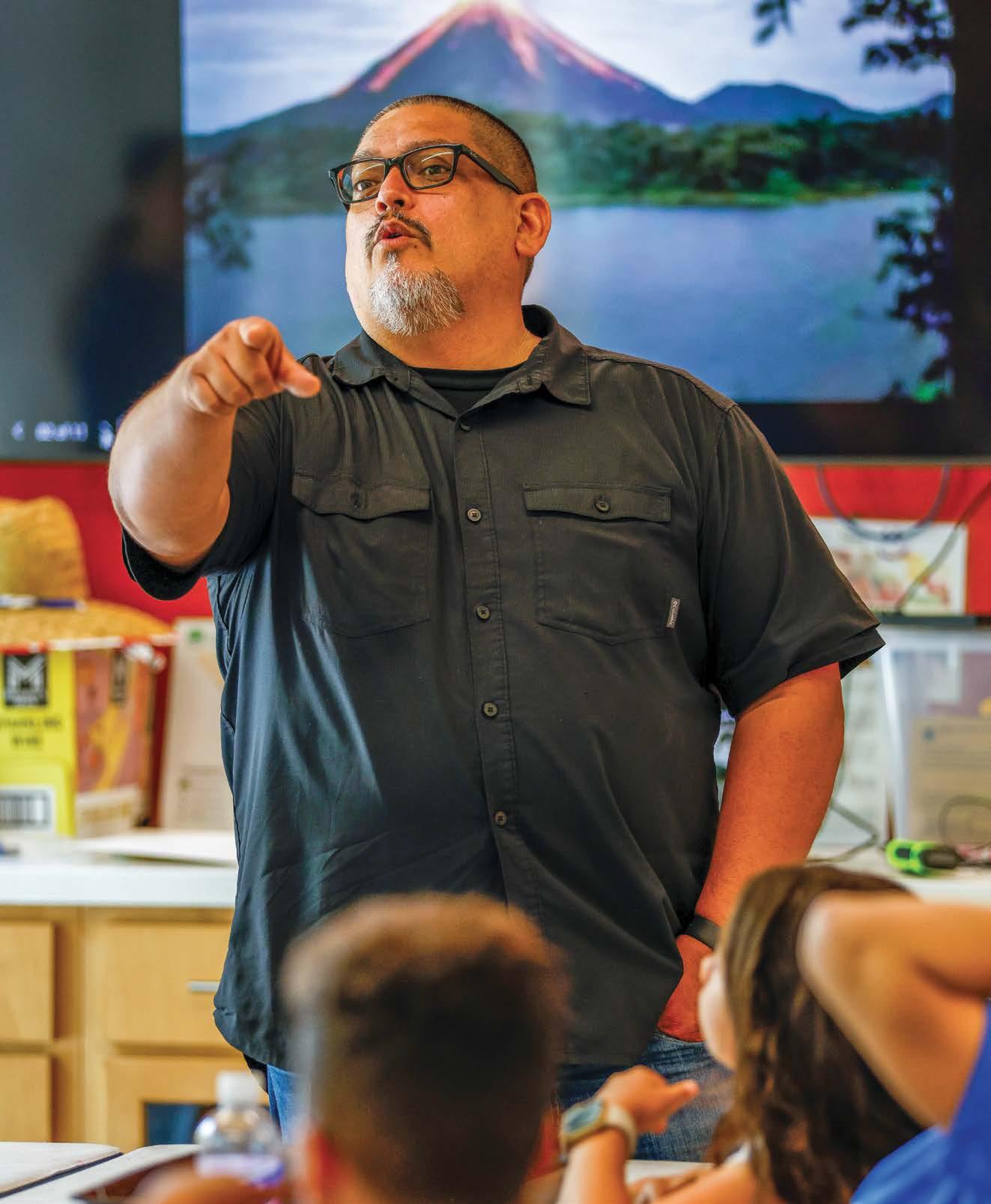
for CREATE, I was with so many people younger than me and older than me who were going to college. Beto encouraged me to enroll at College of Continuing Education, where I earned a few certifications, and then I started at City in the fall of 2023 and graduated in May with an associate degree for transfer in business administration. I’ll be at San Diego State starting this fall.
“He’s doing life-changing work. He’s bringing science and STEM to low-income communities. He’s showing our youth what is possible.”
“I truly believe that Beto’s superpower is his ability to connect with people, regardless of circumstance, and to motivate them to achieve their goals.”
DENISE
WHISENHUNT, FORMER DEAN OF STUDENT AFFAIRS AT SAN DIEGO CITY COLLEGE
Beto added of his work: “Education is open to anyone who wants to be served. As educators, we don’t turn anyone away. No matter where you’re coming from, everyone can agree we need to prepare our American workforce to be innovative if we are to continue to be leaders globally and continue to thrive as a nation. We need to prepare our young people to think bigger, to be aware of what kind of professions are out there.” WE
Above: Beto Vasquez leads elementary school students during a STEM summer camp where kids were experimenting with different chemical reactions that replicated volcanic eruptions.
Supporting the dream
At SDCCE, students find more than a path to citizenship — they find a community of encouragement, a place to be themselves
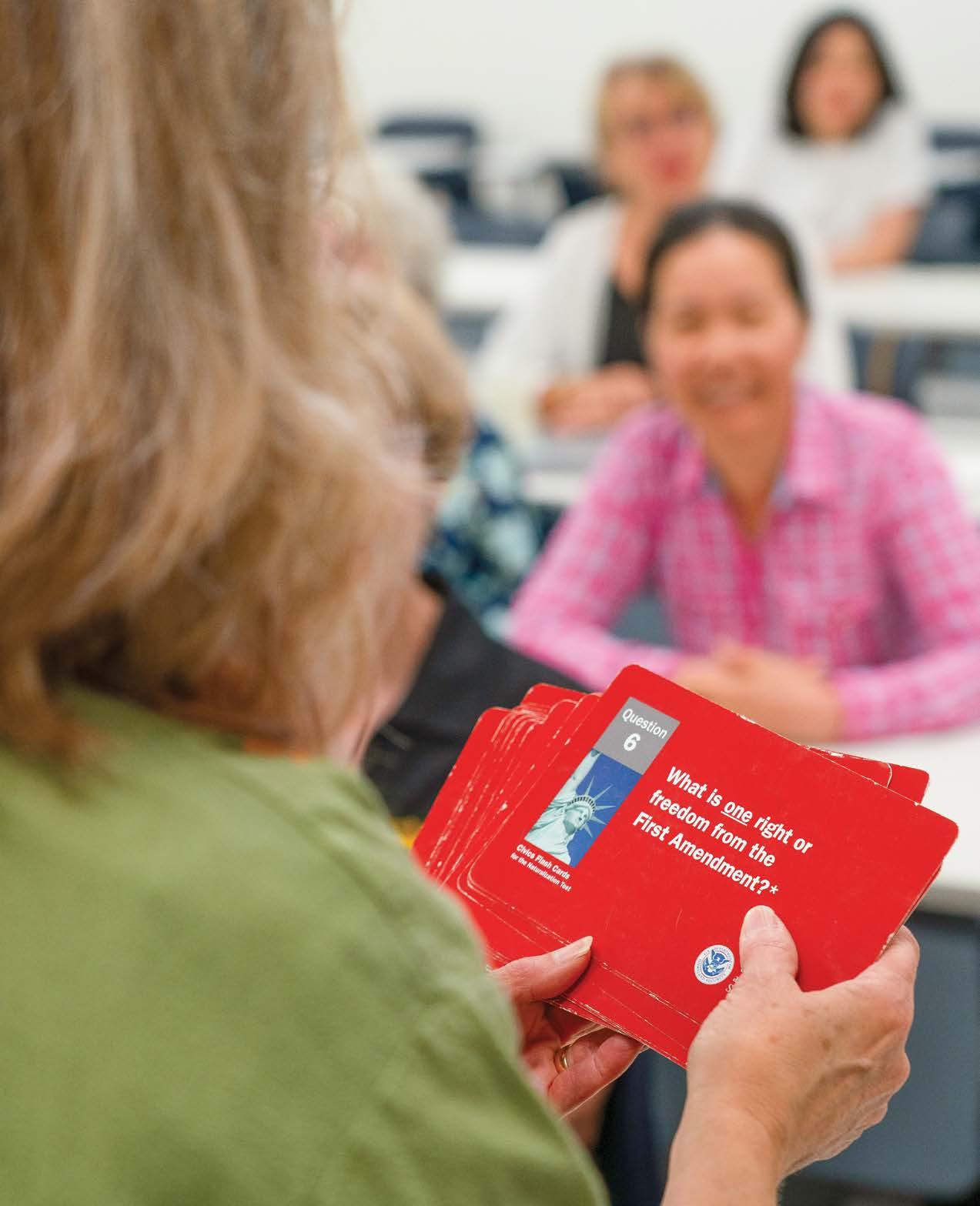
”The fact that a person offers his or her time for free to help you has such profound magnitude and helps you believe not only in yourself but that it is actually possible for you to become a citizen.”
Bettina Andersen, volunteer and former citizenship student
STUDENTS FROM AROUND the world gather at San Diego College of Continuing Education with a shared dream to become United States citizens. For it is there that they find more than a school — it is a community that encourages students to be themselves while providing the support needed for them to create the futures they’ve always envisioned.
One of those students was Bettina Andersen, who came to the U.S. from Denmark in 2014. In 2023, after losing her job and determined to gain the right to vote, Andersen enrolled in SDCCE’s free citizenship program.
“I was incredibly grateful I could access quality education without the cost,” she said.
Inside SDCCE’s Mid-City Campus, often nicknamed the “United Nations” for its joyful mix of cultures, Andersen joined a classroom filled with American flags and even larger American dreams. She studied U.S. history and government, worked through mock interviews, and received personalized guidance from staff and volunteers, including Mike Wapner, a former municipal attorney.
Wapner, who has been volunteering with the program for nearly a decade, originally read in The San Diego Union-Tribune about a need for volunteers for SDCCE’s citizenship program.
Twice a week, Wapner, who was looking for an impactful way to give back to the community, tutors adult learners at SDCCE’s Mid-City Campus. He assists students in strengthening their English and prepares them for the civics test required for naturalization, ensuring they are ready when the time comes for their official U.S. Citizenship and Immigration Services appointments.
“I help make sure their citizenship application is complete and that students are confident heading into their interviews,” he said. “If I do spot an issue, I refer the student to the appropriate resource.”
Wapner’s legal background led him to deepen his knowledge of immigration law — a reflection of his commitment to the program and dedication to ensuring that students, including Andersen, feel both safe and informed.
Just two months before taking her Oath of Allegiance in 2024, Andersen’s mother passed away. To honor her mother, Andersen easily said "yes" to Wapner's suggestion
Volunteers help students study American history ahead of the civics test that is required for naturalization during U.S. Citizenship and Immigration Services appointments.
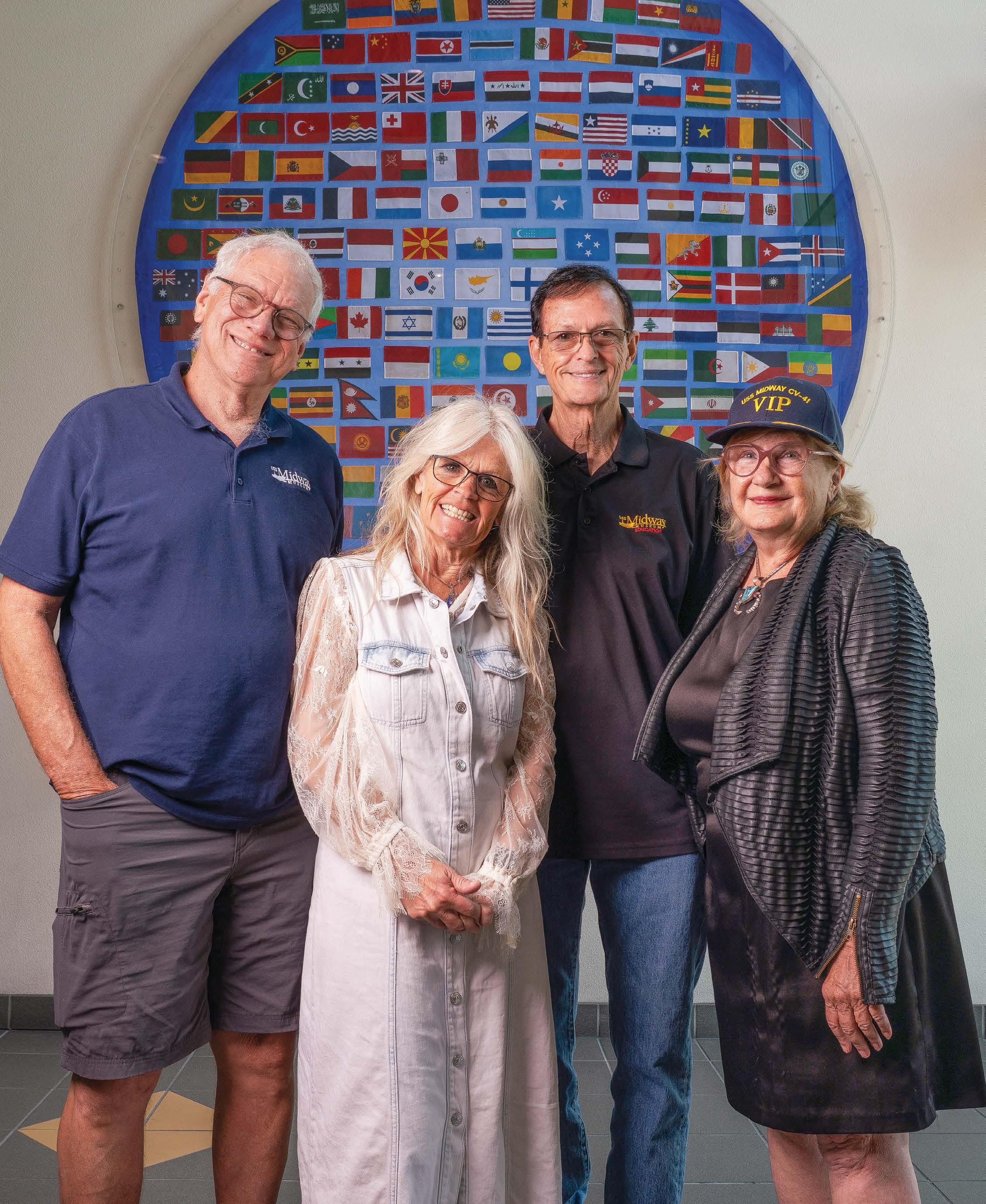
Bettina Anderson (second from left), a former student, now volunteers with SDCCE citizenship program thanks to the encouragement of her mentor Mike Wapner (left). Wapner has been providing his volunteer services, along with Dale W. Santee and Cheryl Brierton, on both the USS Midway Museum and in Mid-City Campus classrooms for nearly two decades.
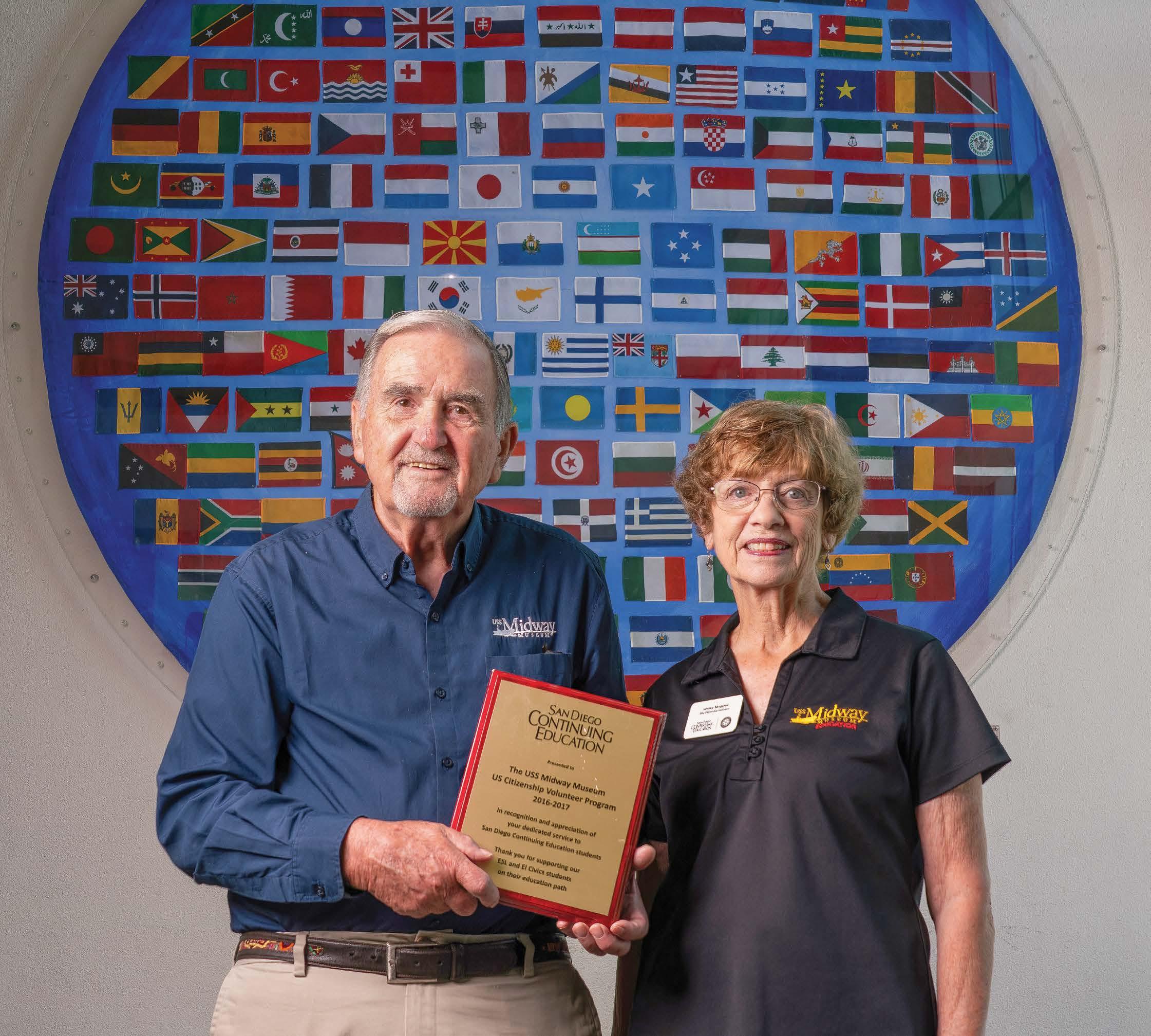
that she become a program volunteer.
“The support I received in the classroom was beyond important,” Andersen said. “The volunteers secured a refuge for citizenship seekers. The fact that a person offers his or her time for free to help you has such profound magnitude and helps you believe not only in yourself but that it is actually possible for you to become a citizen. To be able to pass this positive experience forward is a privilege and a great honor for me.”
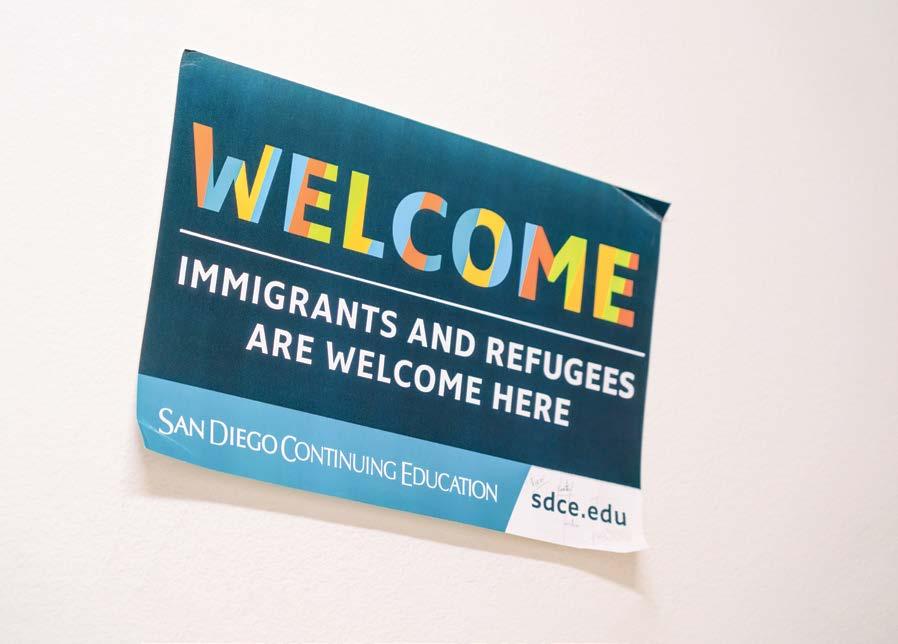
BUILDING LASTING COLLABORATION
It was not just Wapner who, 10 years ago, felt the call of that pivotal Union-Tribune article seeking volunteers for SDCCE citizenship classes. Rudy Shappee, a retired U.S. Navy chief warrant officer and former ESL teacher, was struck with an idea: enlist USS Midway Museum volunteers to support the student citizenship journey. He reached out to College of Continuing
Rudy and Louise Shapee were integral to launching a process for volunteers aboard the USS Midway Museum to also serve as mentors in citizenship classes at College of Continuing Education. The partnership is nearly 20 years old.
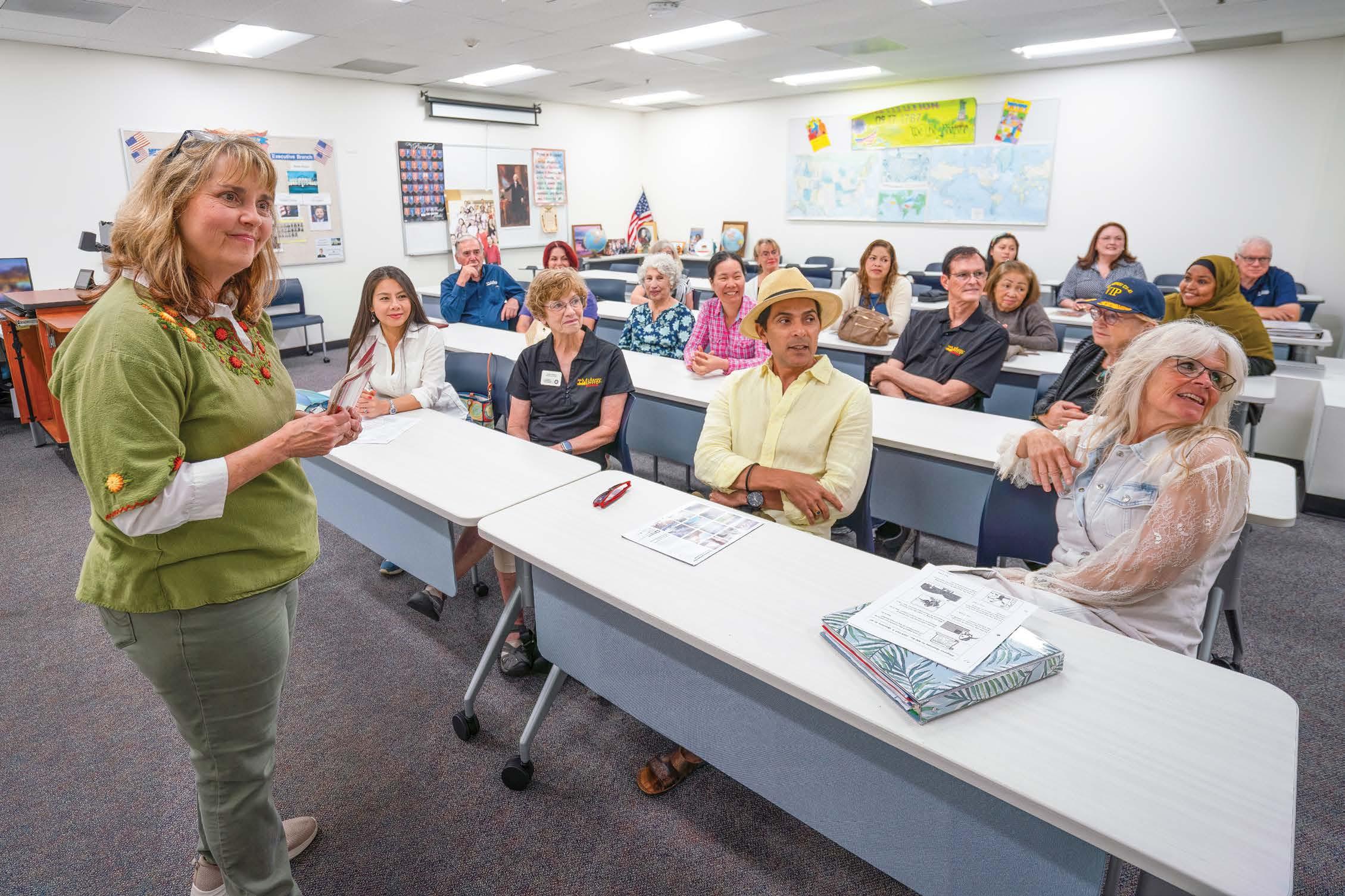
Education, and from there, a unique collaboration was born. With his wife, Louise, also a former teacher, Rudy helped design a formal training process for museum volunteers. Louise now tutors weekly at SDCCE’s Educational Cultural Complex.
For nearly two decades, volunteers from the USS Midway Museum have contributed more than 13,000 hours to SDCCE’s ESL and citizenship classes. The USS Midway Museum is the only military ship in the nation to offer civic volunteer opportunities that support the path to citizenship through a community college partnership.
“The USS Midway once protected the Constitution at sea,” said Wapner. “Now, through this partnership with SDCCE, it helps protect our country by supporting new Americans who want to uphold its values.”
The program now boasts 15 active volunteers serving between the Midway and citizenship classes, operating at full capacity with a waiting list.
Like Wapner and the Shappees, retired
Since 1914, San Diego College of Continuing Education has supported immigrants and refugees from all over the world in becoming new Americans.
On average, between
40-50
students each semester receive a certificate of completion for meeting the required
270
hours for the Pre-Citizenship and Citizenship classes.
Volunteers are crucial for building a welcoming environment where students can feel free to be themselves while also preparing for the citizenship application, the Government and History Test, and the final U.S. Citizenship and Immigration Services interview.
U.S. Air Force Col. Dale W. Santee began tutoring with SDCCE in 2016 following the Union-Tribune article. The story resonated since his father was a naturalized citizen, and his wife is a legal permanent resident.
“I had just retired and wanted to do something meaningful,” he said. “This felt right.”
After observing classes initially, Santee began tutoring at the Mid-City Campus both in person and online, which he continues to do to this day. Now, he leads the USS Midway’s civics program, interviewing prospective tutors for the SDCCE program and guiding new volunteers as they enter the classroom. For Santee, the real reward is seeing students succeed.
“Many of them were doctors, lawyers, engineers in their home countries,” he said. “They gave up everything to start over, and they never complain. They just want to learn, to build something better for their families. They’re some of the most hardworking, appreciative people I’ve ever met.” WE
THE “BE” MOMENT
SDCCE faculty member Mechelle Perrott (left) provides instruction to students and volunteers to prepare for mock citizenship interviews.
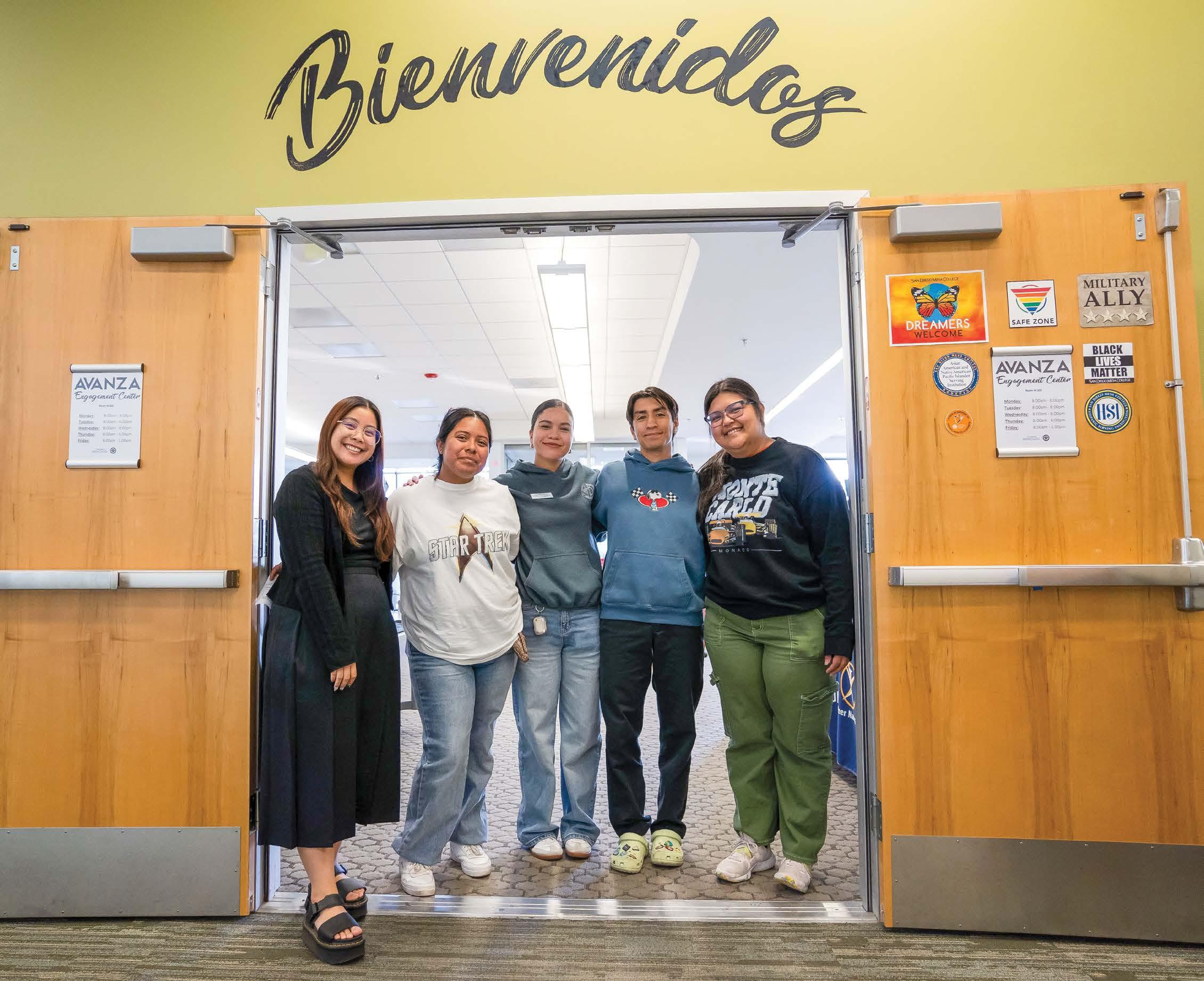
Building spaces of unity
Thoughtfully designed collaboratives provide support, connection for greater student success
San Diego Mesa College is proving that, when it comes to affinity groups, there really is strength in numbers.
THE KUP UNITY VILLAGE WHERE Mesa College, I-400 Building THE SPACE
A place that hosts student support groups, workshops, and presentations.
That’s the driving force behind the college’s CommUnity Spaces, a collection of inviting, thoughtfully designed areas for student support groups, all created to foster greater engagement and a deeper sense of belonging.
At the heart of these CommUnity Spaces, located on the second floor of the I-400 building, is the KUP Unity Village — an acronym for Kapwa, Umoja, and Puente —a hub launched in the spring for instructional presentations, workshops, webinars, cultural events, and opportunities to meet with friends, faculty, and professional staff. Each program brings its own cultural perspective: Kapwa centers around Asian American, Pacific Islander, and Native Hawaiian experiences, Umoja draws from the African-American experience, and Puente is grounded in Hispanic culture.
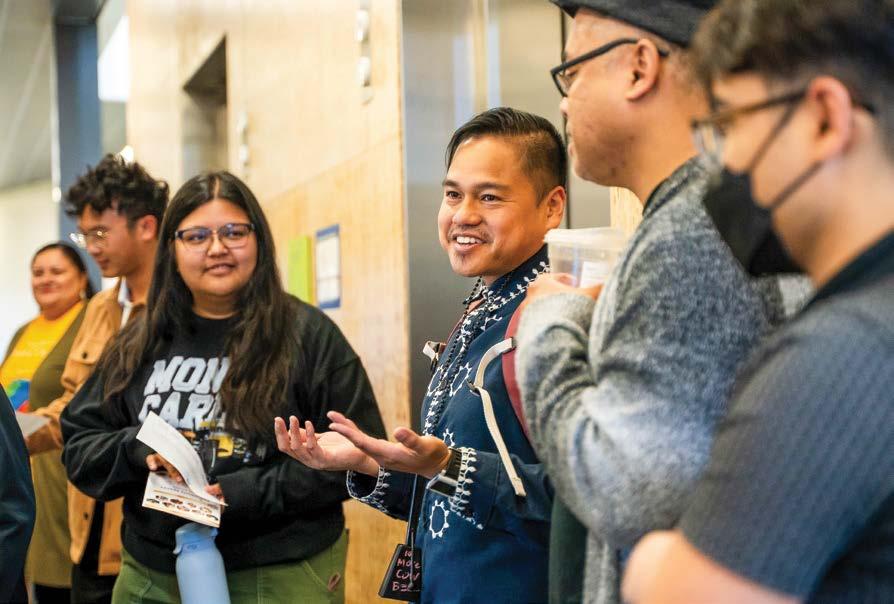
The Mesa College CommUnity Spaces collection opened its doors to students at the end of spring.
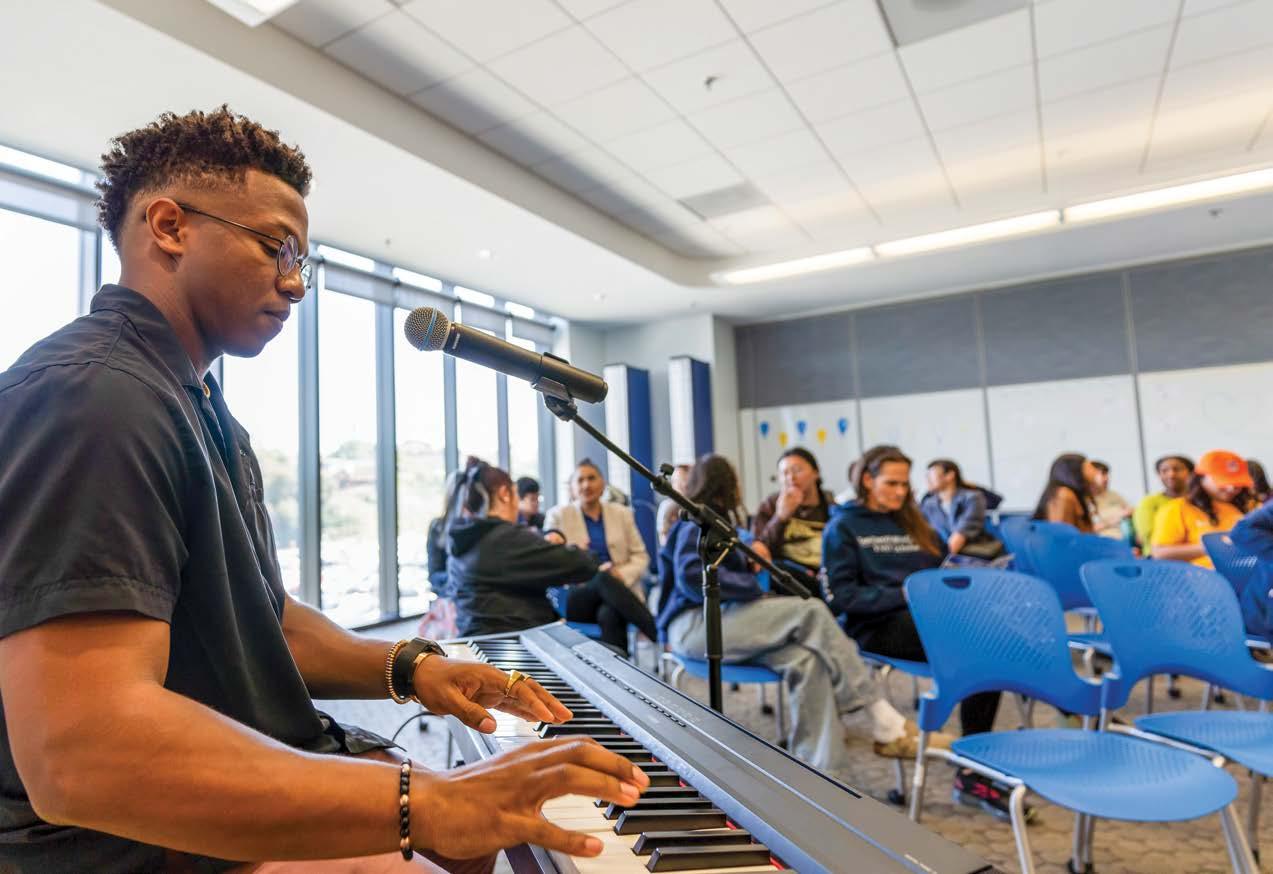
“Students are looking for spaces to connect outside the classroom,” said Patricia “Trish” Guevarra, a Kapwa counselor, coordinator, and assistant professor.
Counselors point to the similarities that make the unification of Kapwa, Umoja, and Puente work so well: all three take a cohort-based approach, where students move through classes as a group, which helps build community. Coursework is culturally relevant, and each program is dedicated to boosting retention, graduation, and transfer rates.
A wide range of events bring these spaces to life. These spaces come to life with a mix of math study jams and relaxed conversations, mental health mindful moments and karaoke nights in the lounge and other common areas.
Students have felt the impact. “KUP Unity Village… became more than just a physical space, but it’s a place where I felt safe, seen, and supported,” said Angela Lopez, a Puente student. “The KUP Unity Village gave me a calm environment to study, rest, and connect with others who share similar values of inclusion, culture, and community.”
Umoja coordinator and counselor Jordan Nash emphasized that affinity programs are open to all interested students, just like how anyone can immerse them-
selves in Irish literature or Greek civilization, regardless of background. What’s key, Nash said, is that “it’s important for folks to know that these spaces are integral to college success for all.”
PROXIMAL SUPPORT
Elsewhere in the I-400 building, are also the Dreamer Resource Center, CalWORKS office, Promise Program advisers, and the Rising Scholars program for formerly incarcerated students. In addition to the KUP Unity Village, Mesa College recently opened an expanded Family Resource Center within the Learning Resource Center for student parents to study with children in tow, attend student-parent workshops, and connect with others navigating similar challenges. This is a critical resource at a campus where one in four students is a parent juggling academics, work, and childcare.
“These spaces are a powerful expression of Mesa College’s deep commitment to equity and student success,” said Mesa College President Ashanti T. Hands. “They serve as daily reminders to our students that they are seen, that they belong here, and that who they are — and who they’re becoming — matters. In these spaces, their aspirations are met with unwavering support every step of the way.” WE
“The KUP Unity Village gave me a calm environment to study, rest, and connect with others who share similar values of inclusion, culture, and community.”
Angela Lopez, Mesa College Puente student
Districtwide Support for All Students
All SDCCD colleges have been working to launch unique support initiatives and spaces for a wide range of student groups. This includes, but is not limited to:
CITY COLLEGE: a newly opened Asian American, Native Hawaiian, and Pacific Islander (AANHPI) Connections Center.
MIRAMAR COLLEGE: an in-progress remodel of the I-building, where The Kaleidoscope will house the Leading Equity, AntiRacism and Diversity (LEAD) Office, the Pride Center, and resource centers for Latine, Black and African American, Native American, and Asian American Pacific Islander students.
COLLEGE OF CONTINUING EDUCATION: among its seven campuses are the Immigrant-Based Support Program Student Center at the César E. Chávez campus, an Intercultural Center at its Mid-City Campus, and, a new Veterans Center is in progress at the Educational Cultural Complex.
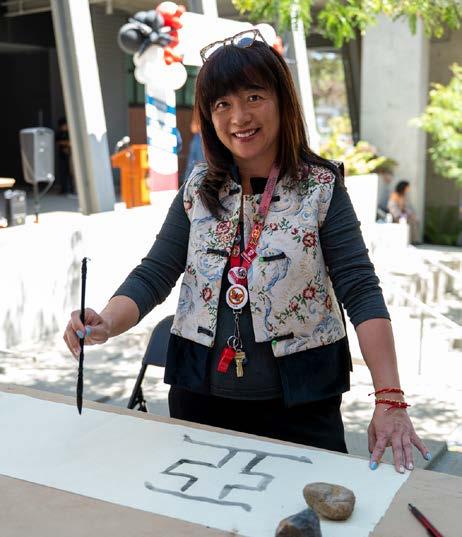
City College's newest AANHPI Connections space is dedicated to fostering belonging, cultural pride, and student success.
Student Angel Wilson performs during the grand opening of the KUP Unity Village.
Action through belonging
Community college gave SDCCD retiree Rusty Krumm a sense of purpose that he paid forward
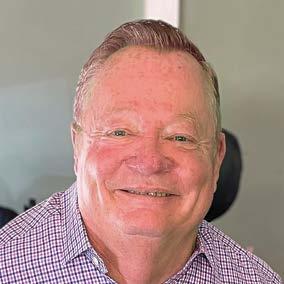
WHO
WHERE SDCCD District Office WHAT Vocational specialist with the Disability Support Programs and Services WorkAbility III program WHEN
From 2002 to 2025
FOR 23 YEARS, ALBERT
“Rusty” Krumm dedicated himself to creating spaces of belonging and opportunity for students with disabilities throughout the San Diego Community College District. Before retiring this past spring, he dedicated his career to helping hundreds of students feel seen, preparing them for careers, and advocating for their needs.
As a vocational specialist with the Disability Support Programs and Services WorkAbility III program, and previously as an employment outreach specialist, Krumm’s influence extends across the District. He helped shape a culture of belonging and inclusion among faculty and staff — he was a trusted voice who understood the challenges of students with disabilities because he had lived them.
“Rusty is an amazing example of what people with significant disabilities can accomplish when access is ensured,” said Poppy Fitch, dean of Wellness and Disability Support Programs and Services.
A spinal cord injury left Krumm quadriplegic at age 12. At that time, 1969, living a meaningful life with disabilities was uncertain. Education and inclusion were afterthoughts in a world not built for people with disabilities. Doctors advised his parents to institutionalize him. They refused.
“Schools weren’t accessible. There were no disability rights laws, no internet, no road map. It was learn-as-you-go,” Krumm recalled. “But growing up in a small town in South Jersey had its upside; people looked out for each other.”
That sense of community planted early seeds of resilience. Still, adulthood came with its own barriers. After moving to San Diego in 1982, Krumm struggled to find employment. Like many people with visible disabilities, he faced limited opportunities. Instead of giving up, he turned to the SDCCD and enrolled in classes at San Diego City and Mesa colleges.
“For years, I volunteered and took classes just to feel part of something,” he said. “Community college gave me a sense of purpose before I even realized that’s what I was looking for.”
A turning point came in 2002 when Rusty, then working at a nonprofit independent living center, met DSPS instructor Lori Contreras. After witnessing his passion for advocacy, she encouraged him to apply for an open position in the WorkAbility III program at the SDCCD. It would become his first full-time job at age 43.
“That is when I found belonging. I was overwhelmed with gratitude when I got my long-awaited job. I was so happy I wanted to frame my first paycheck,” Krumm said. “There is such a remarkable difference between collecting disability benefits and collecting a paycheck. I cried knowing I was giving back.”
And the District, he said, led by example in supporting him. Krumm remembers various hardships, including local wildfire emergencies and when he broke his femur, where the District and his immediate supervisors stepped up to support him and his colleagues. “That kind of support shows you what real belonging looks like,” he said.
Assistive technology also played a role in his own success. At Access to Independence and the SDCCD, Krumm found workplaces that not only understood his needs but also anticipated them.
“Having an employer who understands and embraces assistive technology makes a world of difference. The SDCCD went above and beyond, not only supplying assistive devices but also ensuring I had access to the latest technology and tailored everything to my needs.”
Now happily retired, Krumm enjoys spending time with his family and community, and he continues to be an active advocate. He currently mentors a young man with multiple disabilities, helping him navigate education, independence, and employment.
“He’s a triple amputee who was homeschooled his entire life. It’s been a fun and eye-opening experience, and I’m hopeful he’ll soon be connected with SDCCD, California Department of Rehabilitation, and the WorkAbility III program,” shared Krumm. WE

ILLUSTRATION
BY
MICHELLE GUERRERO
Rusty Krumm

“Being invited into a student’s journey is something I never took for granted. When someone reaches out for support, it’s a brave act. I always tried to meet them with compassion.”
Rusty Krumm
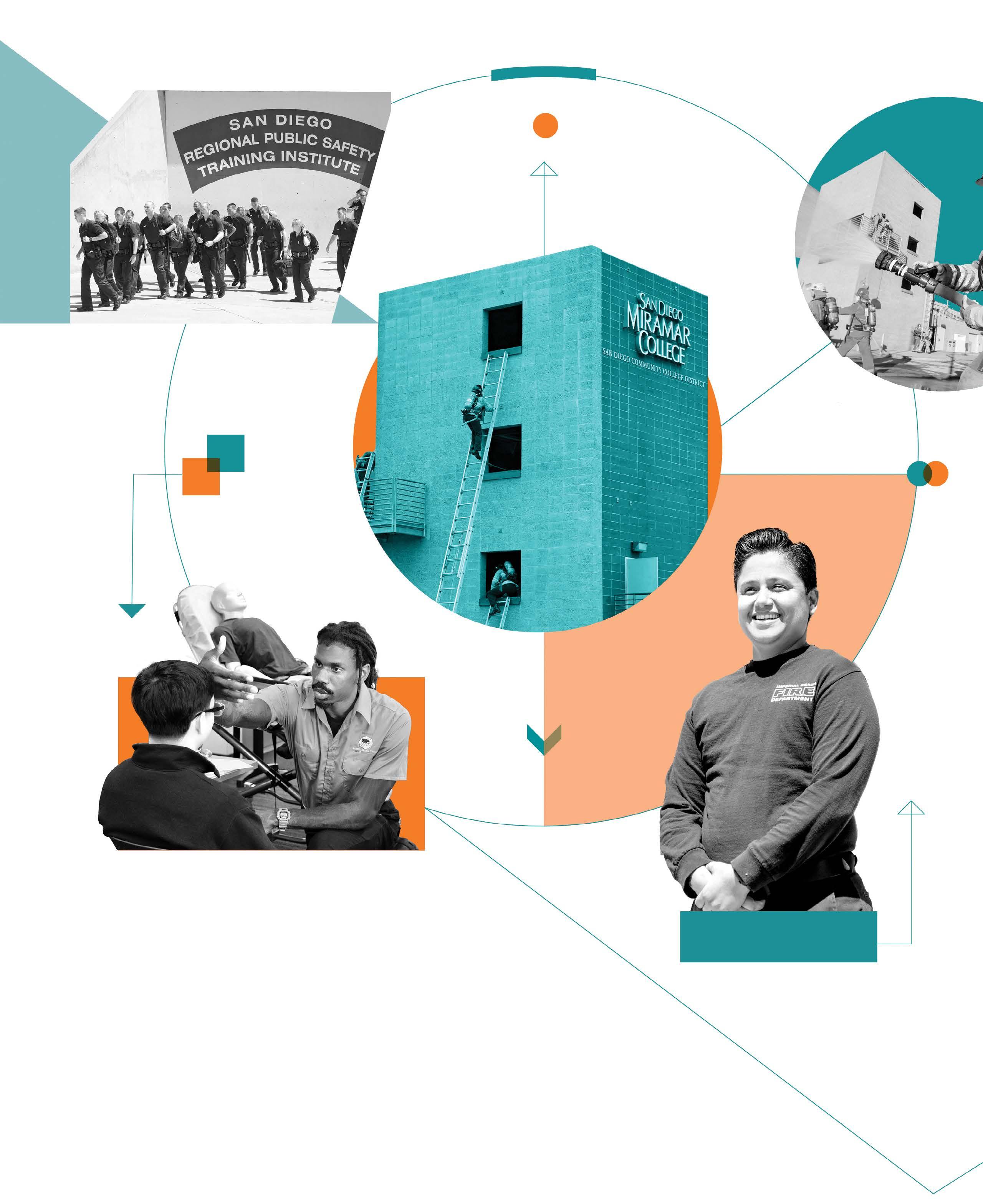
RISING TO SERVE
Miramar College’s new public safety management bachelor's degree empowers students to become leaders in their communities
When Destiny Garcia heard about the new public safety management bachelor’s degree at San Diego Miramar College, she saw more than a chance to advance her career — she saw a way to make a difference in her community. This fall, Miramar College welcomed 43
students into its inaugural baccalaureate program, which includes two tracks for students in either emergency management or law enforcement. The four-year degree builds on the college’s well-established associate and certificate programs within its School of Public Safety, offering a pathway for current public safety professionals and aspiring
Erika Tello
leaders to deepen their expertise — at a cost of around $10,500.
“This is great news for local students and current public safety employees looking to obtain a degree in the public safety sector,” said Wes Lundburg, Ph.D., president of Miramar College.
Among the first cohort are Garcia, Ulizes Sanchez, and Erika Tello — each bringing a unique story and motivation for joining the program.
Garcia, a former communications dispatcher for the Riverside Fire Department, earned her associate degree in administration of justice during the pandemic before entering the workforce. The mother of two is eager to gain new skills that will help her better connect with her community during high-stress situations.
“This education will bridge the gap between my national service and my heart to serve the community in a more direct, impactful way.”
Erika Tello, U.S. Navy veteran and baccalaureate student
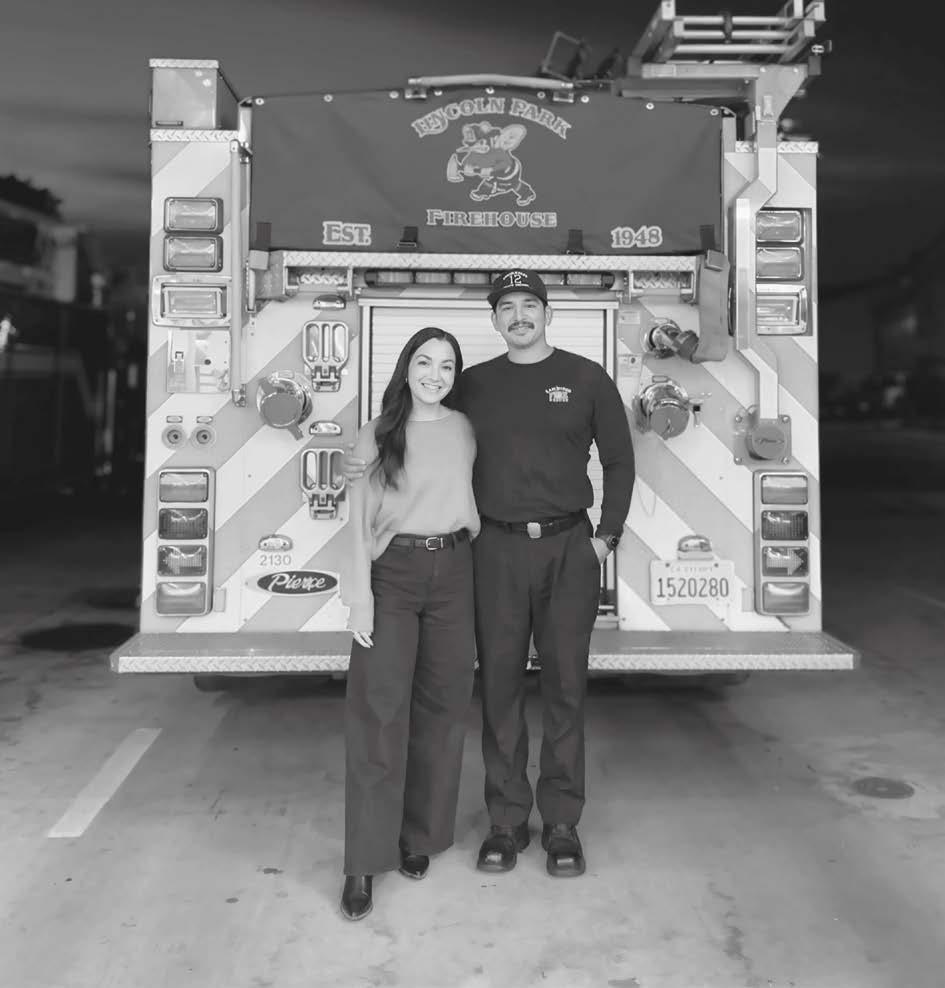
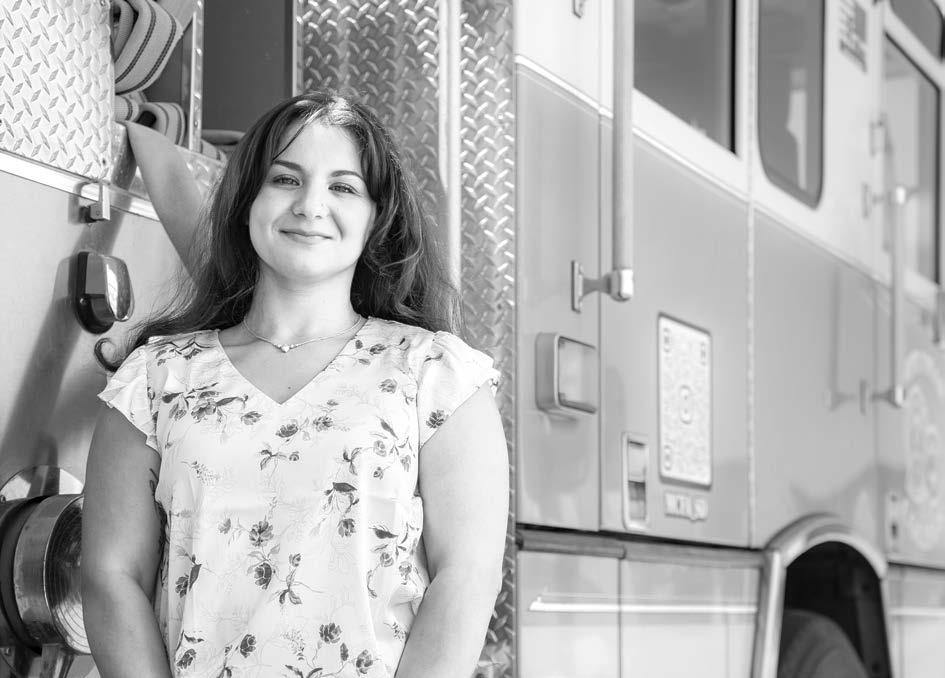
“In a tense incident, I want to learn how to work with different personalities and guide everyone toward a positive outcome,” she said.
THE “BECOME” MOMENT
Most students in the program are already working in fire service, law enforcement, lifeguard operations, or emergency medical response. The curriculum includes 22 upper-division courses such as Contemporary Public Safety Practices, Ethics in Public Safety, Strategic Planning, and Advanced Criminal Investigation. The inaugural program culminates in a semester-long research project in spring 2027.

For Sanchez, who is currently working as a firefighter out of Station 12 in Lincoln Park, the degree is a step toward fulfilling a childhood dream: becoming a captain — and eventually a battalion chief — with the San Diego Fire-Rescue Department. He earned his EMT certification and associate degree in fire protection technology at Miramar College before joining the field.
As a child in Barrio Logan, Sanchez witnessed a fire break out at a furniture store. He remembers the helplessness he felt — and the language barrier between responders and residents.
“No one could speak Spanish, but I could,” he recalled. “I wanted to help, but I was too afraid.” Now, he’s determined to be the kind of leader his community can count on.
Tello, a U.S. Navy veteran with 21 years of service, brings a wealth of experience from her time as an emergency manager in Bahrain. Since enrolling at Miramar College last year, she’s earned Fire Inspector Certifications and volunteers with the Imperial Beach Fire Department.
“This education will bridge the gap between my national service and my heart to serve the community in a more direct, impactful way,” she said.
Graduates of the program will be equipped to pursue living-wage careers, advance professionally, and serve their communities with greater impact.
“This bachelor’s degree will not only strengthen the community’s trust in Miramar College,” said Lundburg, “but it will allow first responders to be in line for promotions and salary advancements that come with obtaining a fouryear degree.” WE
Destiny Garcia
Ulizes Sanchez
CITY COLLEGE
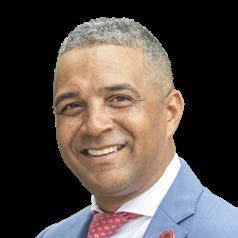
"This is a true celebration of teamwork, resilience, and commitment to quality nursing education."
DOMETRIVES “DEE” ARMSTRONG, ASSOCIATE DEAN OF NURSING EDUCATION AT CITY COLLEGE
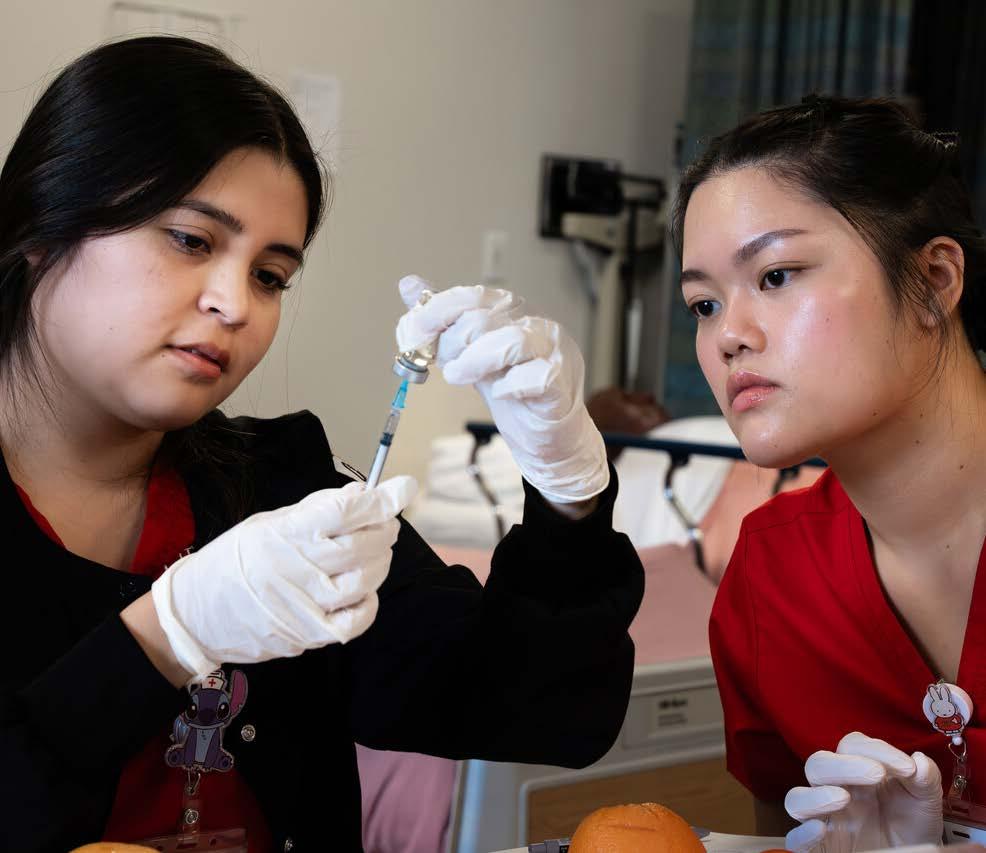
Nursing Program rises to the top in national examination
San Diego City College’s Nursing program continues to thrive. This year, the program graduated 57 students, and of those graduates, 100% who have taken the National Council Licensure Examination (NCLEX) passed, with four still waiting to take their exams. The NCLEX, which is required for students to pass to officially receive their registered nurse credential, uses real-world case studies to measure a nurse’s ability to think critically and make competent decisions.
“This achievement reflects the dedication of our students, faculty, and clinical partners,” said Associate Dean of Nursing Education Dometrives “Dee” Armstrong. “A 100% National Council Licensure Examination pass rate is a powerful testament to the quality of education and preparation our program offers, reinforcing our commitment to excellence in nursing education and patient care.”
Armstrong noted that the first-time national pass rate for the NCLEX-RN was approximately 91.2% this year.
“I am incredibly proud of our graduates and the nursing team who continuously exceeds expectations for our students. This is a true celebration of teamwork, resilience, and commitment to quality nursing education,” she said.
Over the summer, the Nursing Program was awarded the San Diego State University Career Services Grant in support of student success. The grant of $117,000 over two years will help students succeed in the program by making available mentorships and mental health counseling. A peer mentorship program will be led by second-year students who will support first-year students with oversight from two nursing faculty members. The grant also will help with licensing fees for the NCLEX exam.
FACES OF CITY COLLEGE
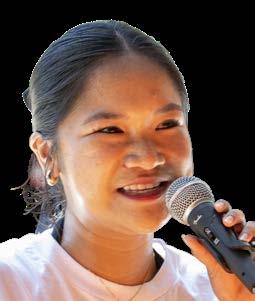
“I feel like the people at City really care about you. The professors care about what you’re learning, they’re accessible if you need them, and there is a lot going on.”
Louise Nicolei Perez, president of the Asian and Pacific Islander Student Alliance, saw a “You Belong Here” banner at City College as a sign to stay local, instead of heading to EmbryRiddle Aeronautical University in Florida. The decision changed her whole career trajectory. Rather than becoming a pilot, she earned a bachelor of science associate degree and is now focused on becoming a registered nurse.
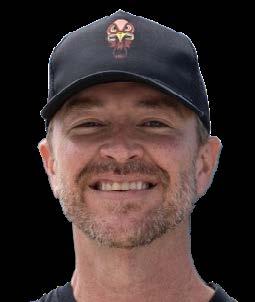
“I’m a people person. I love meeting new people and getting to know them. That’s where I draw my inspiration. The people around me inspire me. It’s all very circular.”
John Dalton, former member of San Diego-based hip-hop group The KneeHighs, studies music at City College while also being a mentor to other student musicians. Dalton’s journey with sobriety underscores the power of change, as he channels his past struggles into future creativity. Dalton credits the music program with giving students an opportunity to grow creatively while also gaining practical skills for the industry, as well as helping build confidence.
Visits to the Knights’ Table Food Pantry during the 2024-25 academic year.
Students practice drawing and administering injections during a nursing class at City College.

Professor named Knight of the Order of Academic Palms
San Diego Mesa College professor of French Uriel Ornelas has been named a Knight (Chevalier) of the Order of Academic Palms (l’Ordre des Palmes académiques), one of France’s highest honors recognizing service to education and culture. The distinction was presented by Adrien Frier, Consul General of France in Los Angeles, during a ceremony at the Résidence de France in Beverly Hills on September 12, 2025.
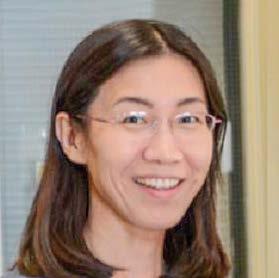
Unsung hero
Each year, the Unsung Hero Award recognizes a colleague whose quiet dedication has a powerful impact on our campus. This year, Mesa College is proud to honor Ikuko McAnally, whose steady presence brings clarity, compassion, and consistency to every task, from navigating complex budgets and grants to supporting equity driven programs. McAnally’s behind the scenes work strengthens student initiatives and uplifts everyone around her.
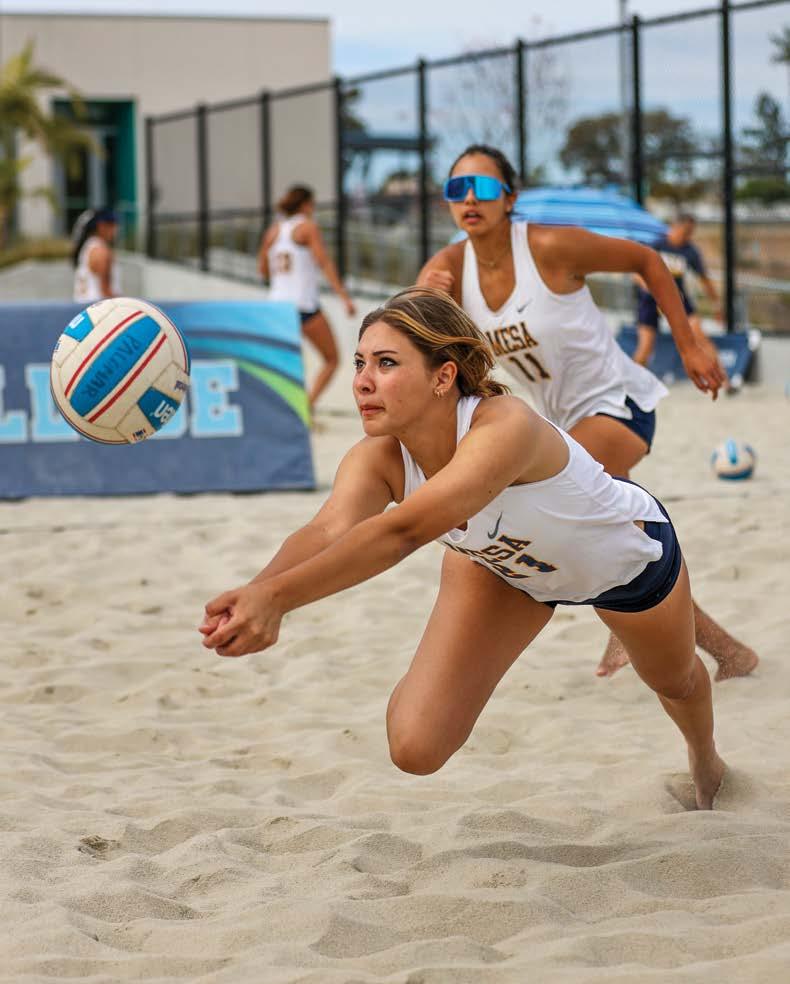
Mesa College among top two-year athletic programs WINNING ATHLETICS
San Diego Mesa College finished second in the 2024–2025 Ron Case Cup standings, cementing its athletics program among the top in the nation.
Presented by the National Alliance of TwoYear College Athletic Administrators, scoring for the Ron Case Cup is calculated based on a college’s top five men’s and top five women’s team finishes in state championships.
This year, Mesa College was led by:
• State Champions: Women’s Beach Volleyball, Men’s Cross Country, and Women’s Cross Country
• State Finalists: Men’s Track & Field (6 individual state titles) and Men’s Volleyball
• Third in State: Women’s Track & Field (1 individual state title)
The Ron Case Cup ranks programs from across California, Oregon, and Washington, based on their success in state championships.
“This is an incredible accomplishment and a reflection of the hard work, talent, and dedication of our student-athletes, coaches and support staff.”
RYAN SHUMAKER, DEAN AND ATHLETIC DIRECTOR AT MESA COLLEGE
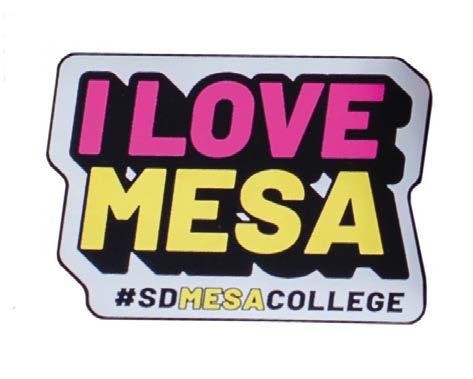
BY THE NUMBERS
Mesa College Outreach Office
During the spring term, the Outreach team, consisting of 14 student ambassadors, two project assistants, and two Promise project assistants, supported:
97
Number of hours of campus tours
164
Number of hours fielding questions through Ivy.ai chat (aka: Olympia, the Mesa College website chatbot)
278
Number of hours at feeder and CCAP (College and Career Access Pathways) high schools
536
Number of hours of tabling and community events
1,896
Number of active Year 1 and Year 2 cohort students in the San Diego Promise program thanks to outreach efforts at area high schools
MESA COLLEGE
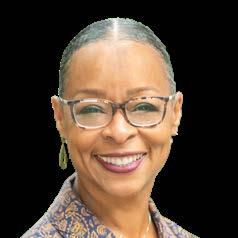
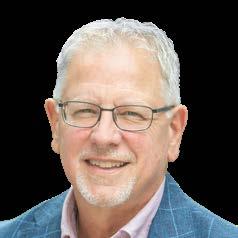
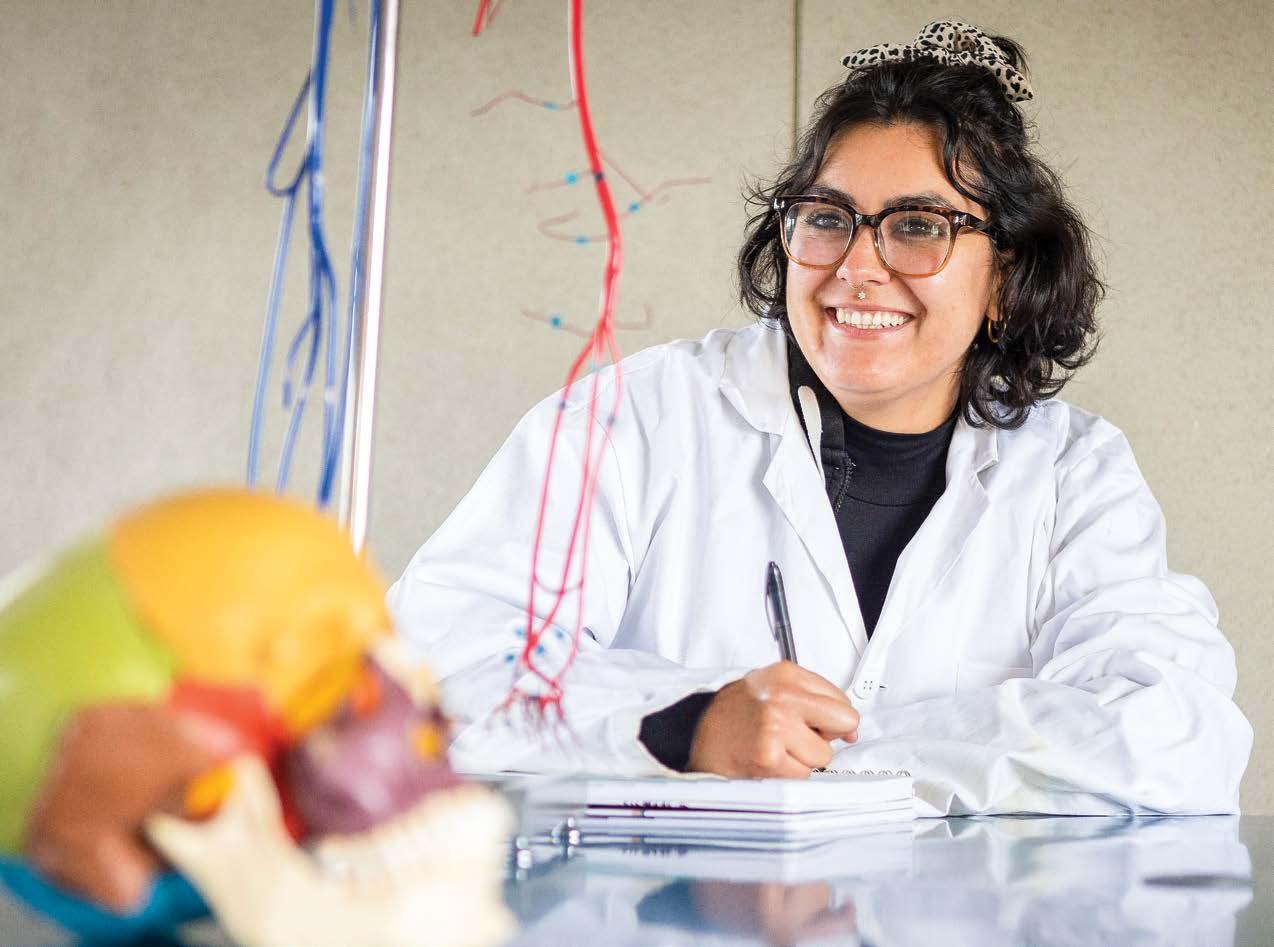
Biotech boost at Miramar College Campus Notes
Athree-year grant from the National Science Foundation, an independent federal agency that supports science and engineering in the United States, will fund San Diego Miramar College’s Building Pathways from High School to College for Increased Biotechnology Career Readiness, which will support the training of future biotechnology technicians.
“This is a terrific accomplishment for our STEM and science programs,” said Wes Lundburg, president of Miramar College. “It is our long-term strategic vision to become the San Diego region’s ‘go-to’ institution for training the next generation of skilled workforce professionals in the field of biotechnology. These funds will help build the foundation.”
To address the urgent need for skilled biotechnology technicians, the goal of the project is to create a direct pathway to Miramar College for biotechnolo -
gy related technical training for students, according to professors Rebecca Bowers-Gentry and Shawn Hurley. As principal investigators, Bowers-Gentry and Hurley will lead the new initiative with Heather Holmes, Kim Teston-Fierro and Tracey Milani in partnership with local industry and educational partners to provide opportunities that will seamlessly guide high school students to a certificate of achievement in biotech at Miramar College and to skilled technician careers in the biotechnology industry.
The Advanced Technological Education (ATE) program focuses on the education of technicians who work in high-tech fields that drive the nation’s economy. Because two-year community and technical colleges are the leading sources of technician education in the United States, faculty from these higher education institutions have had leadership roles in most ATE projects since the program began in 1993.
$469,540
Amount of the Advanced Technological Education grant from the National Science Foundation
Jacquie Keller named to board
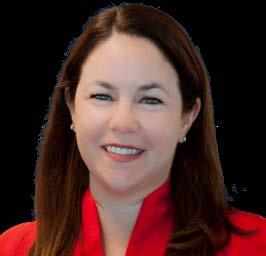
Jacquie Keller, chief marketing officer of Neurochase, has been named to the San Diego Miramar College Foundation Board as a community member. Keller is a distinguished San Diego-based Life Sciences executive with over two decades of global commercial leadership, renowned for scaling revenue, driving innovation, and successfully navigating complex mergers and acquisitions and financing landscapes. Her expertise spans corporate, strategy, business development, sales, marketing, clinical research, reimbursement, and investor relations within innovative medical device companies like Neurochase Limited, ClearPoint Neuro, Inc., Philips, and Volcano Corporation.
Cleanup crew
Students from Miramar College’s Emergency Medical Technician and Fire Academy programs demonstrated their commitment to service and community engagement by volunteering in a campus clean-up at Lincoln High School on August 7. The effort was part of preparations to launch Lincoln High School’s Fire Program for the upcoming academic year.
The student volunteers — future first responders — spent the day working alongside faculty, San Diego Fire-Rescue, and community leaders to ensure the facility was ready to welcome the next generation of fire service students. Their willingness to dedicate their time and energy is a testament to their dedication to the communities they will one day serve.
The collaboration between Miramar College and Lincoln High School reflects a shared goal: to provide students with meaningful, hands-on opportunities that connect classroom learning with real-world service.
Skilled biotechnology technicians are urgently needed in the local workforce.
$169,387
The amount awarded for a three-year grant from the California Community Colleges Chancellor’s Office to launch the first-ever Rising Scholars Program at the Educational Cultural Complex
Uplifting Rising Scholars
San Diego College of Continuing Education has been awarded a three-year grant from the California Community Colleges Chancellor’s Office to launch its first-ever Rising Scholars Program at the Educational Cultural Complex, a milestone achievement to advancing restorative education and reentry support.
While the College of Continuing Education already offers more than 80 tuition-free certificate programs and critical wraparound support services, the Rising Scholars Program is specifically designed to eliminate barriers to education for students impacted by the criminal justice system. The program will provide justice-impacted individuals with essential academic and personal resources, including legal rights referrals, community service connections, and reintegration support, while fostering personal growth and pathways to career success.
“For the first time ever in our 110-year
history, San Diego College of Continuing Education has received funds to deliver highly targeted resources and support to justice-impacted students who are so ready and willing to change the trajectory of their lives,” said Tina M. King, College of Continuing Education President. “We are profoundly grateful to the California Community Colleges Chancellor’s Office for their support and including noncredit students in this program. This grant is more than funding, it’s a commitment to equity that ensures justice-impacted individuals are seen and supported to rise as learners, leaders, and changemakers in their communities.”
The Rising Scholars Program at SDCCE is part of a broader statewide initiative. SDCCE joins a growing number of California community colleges leading the charge in advancing educational equity for justice-impacted populations. Nathan Klein will be the program’s first Rising Scholars Counselor.
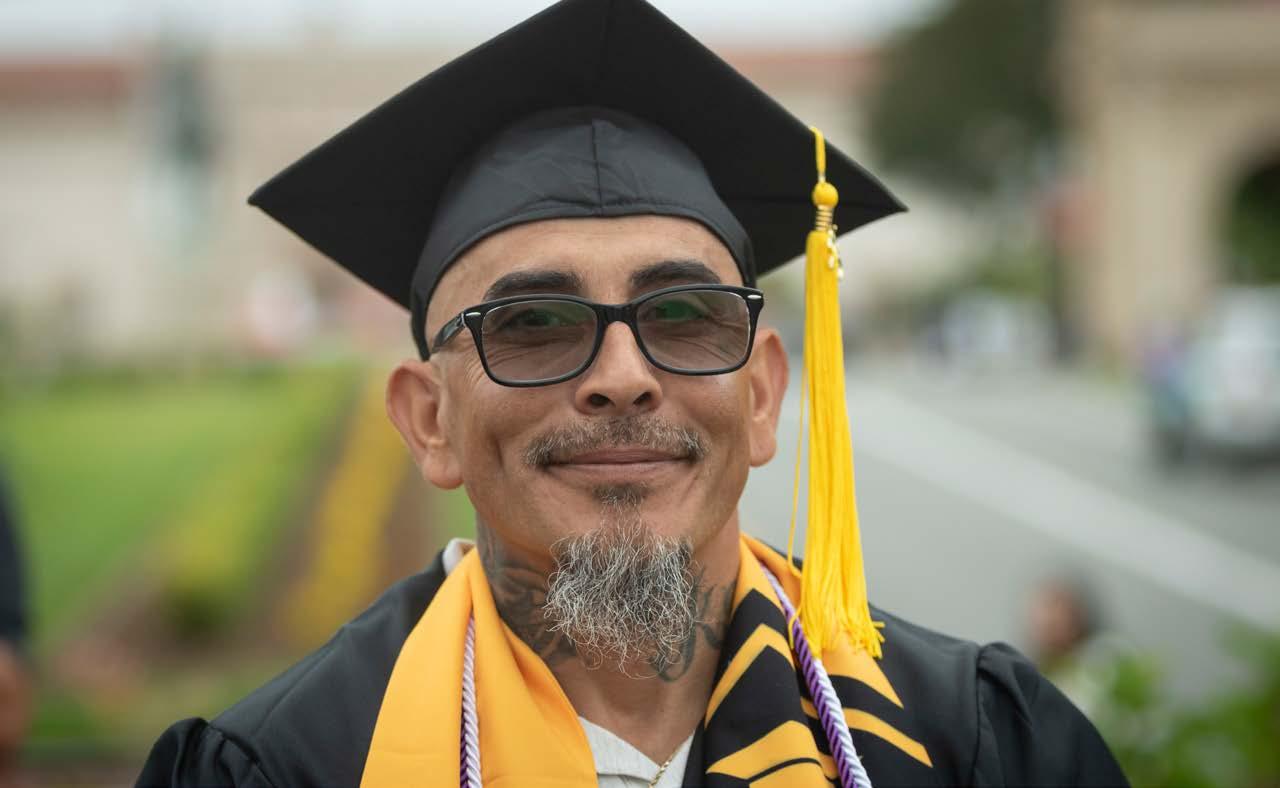
“I finally realized that if something didn’t change, I was either going to be in prison for the rest of my life or found dead somewhere.”
FRANCISCO CONTRERAS, who, at 15, dropped out of high school and spiraled into a cycle of drugs, gang violence, and incarceration. Now, at 47, with support from San Diego College of Continuing Education, he is a high school graduate and is advancing in his construction career and continuing his studies at SDCCE.
The Roundup
Prioritizing mental health

In September, the Educational Cultural Complex held a grand opening event for its Be Well Mental Health Center in Room 177. This new center is dedicated to supporting the well-being of students by providing a safe space and access to mental health resources. The opening marked a milestone in College of Continuing Education’s commitment to student well-being.
“Sustained in Unity” drives SDCCE forward

This year’s college-wide Convocation, held at the San Diego Central Library, centered on the theme “Sustained in Unity.” The event set the tone for a year grounded in equity, inclusion, and community and featured acclaimed anti-racist educator Tim Wise as keynote speaker. Those in attendance helped launch the new academic year with energy, purpose, and collective commitment.
Task force focuses on inclusiveness

College of Continuing Education is deeply committed to fostering a campus environment grounded in inclusivity, equity, and respect for all — regardless of background or immigration status. The Safety, Inclusion, and Belonging Task Force, established earlier this year, aims to develop meaningful strategies, solutions, and resources that support the community in today’s social climate. Additionally, the task force is implementing more support for employees who are assisting students by providing space for reflection and continued access to critical resources. The task force is currently developing mock trainings to de-escalate tense situations and active training scenarios around navigating through any challenging situations with U.S. Immigrations and Customs Enforcement that may occur.

Chavez draws culinary inspiration from Mesa College professor Tonya Whitfield
About two years ago, Melissa Chavez knew something was missing in her life. Like many others, her day job left her unfulfilled and uninspired. Hoping to find a better fit, she made a list of everything she loved — music, plants, and baking. That list helped her see a new path forward.
With a fresh sense of purpose, she made a life-changing decision: she moved from Palm Desert to San Diego in 2023 and enrolled in the Culinary Arts Program at San Diego Mesa College. In May 2025, she earned an associate degree and certificate in Culinary Arts and Culinary Management.
Today, Chavez is taking the next step in her journey. in the French Alps, where she secured an internship at the Mercure Aix-les-Bains Domaine de Marlioz Hôtel & Spa — ready to apply what she learned at Mesa College.
Budding chef heads to the French Alps NEWSMAKER
WE recently checked in with Chavez who explained how she found Mesa College and what she is cooking up next.
Who inspired you to pursue a culinary career? Chef Tonya Whitfield is a huge source of inspiration. Her passion for teaching and the way she supports and challenges her students made me think about becoming a teacher myself one day. Watching how she helps others grow made
me want to do the same — share what I’ve learned and help others discover their own passion for cooking.
How did you know Mesa College’s culinary program was the right fit for you? I remember the first summer I went to Mesa College to pick up a textbook. Seeing the campus for the first time, I could immediately picture myself there. It was such a beautiful place. Once classes started and I got to see the Culinary Department — I knew without a doubt that this was the right place for me.
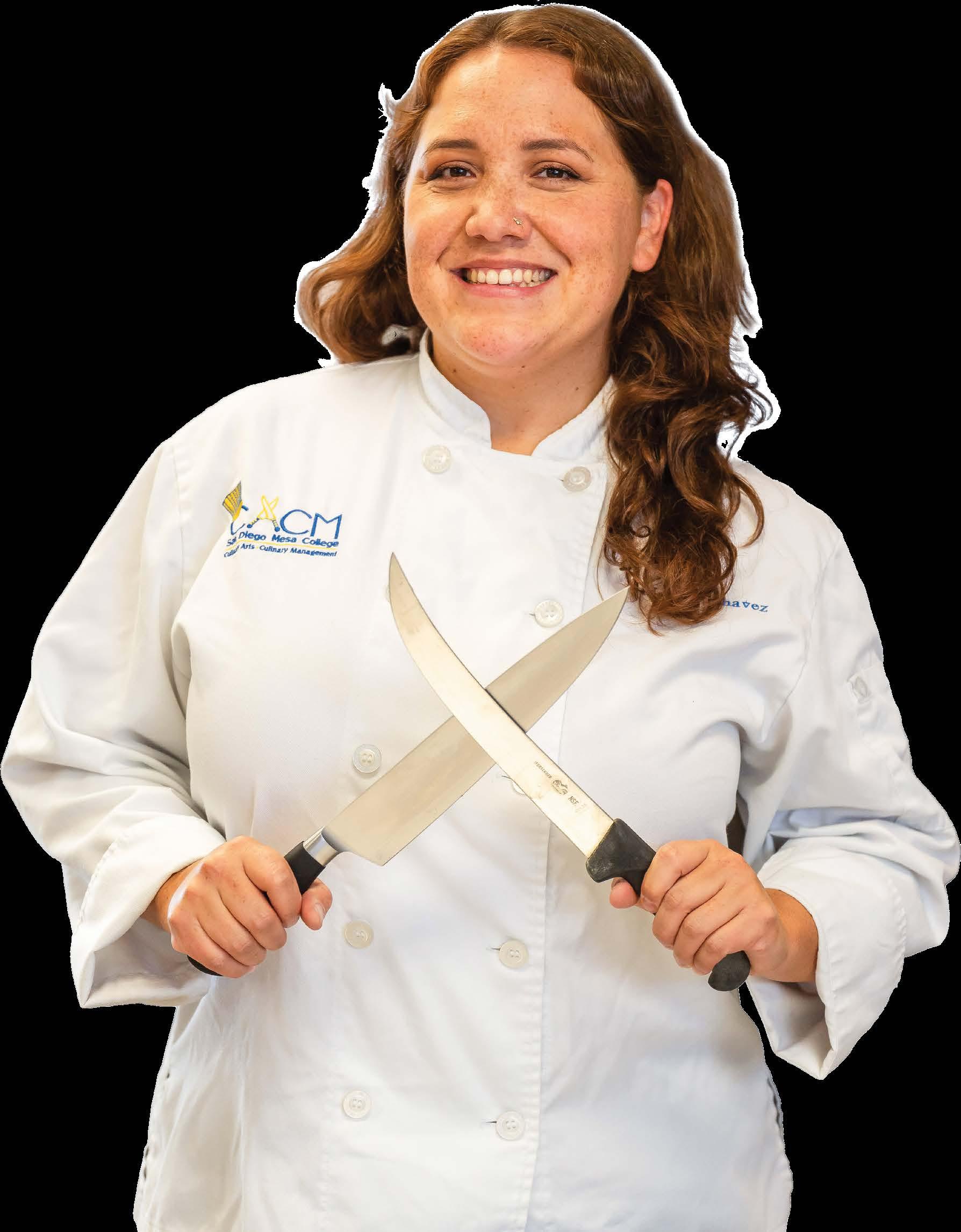
What were some of the highlights of the program? One of the biggest highlights is the hands-on experience we get from day one. The facilities are incredible. The professional kitchen and on-campus restaurant make the learning environment feel very real and dynamic. We don’t just learn from textbooks; we’re in the kitchen applying techniques, learning how to work as a team and understanding what it takes to succeed in the industry. The community at Mesa College is also something truly special. Everyone is passionate, supportive, and motivated, which makes the experience even more meaningful.
What are some of the most important lessons you learned from the program? One of the most important lessons I’ve learned in the program is not to let failure stop you from trying. In the kitchen, things don’t always go as planned, recipes don’t turn out right, techniques take time to master, and mistakes happen. But I’ve learned that failure is just part of the process. What really matters is having a positive attitude and the willingness to keep learning. That mindset has helped me grow and become a better chef.
What would you say to anyone considering the program? Go for it! Don’t let lack of experience, age, or any other factor stop you from trying something new. WE
Melissa
PARTING SHOT
PHOTO BY REMO SAGASTUME
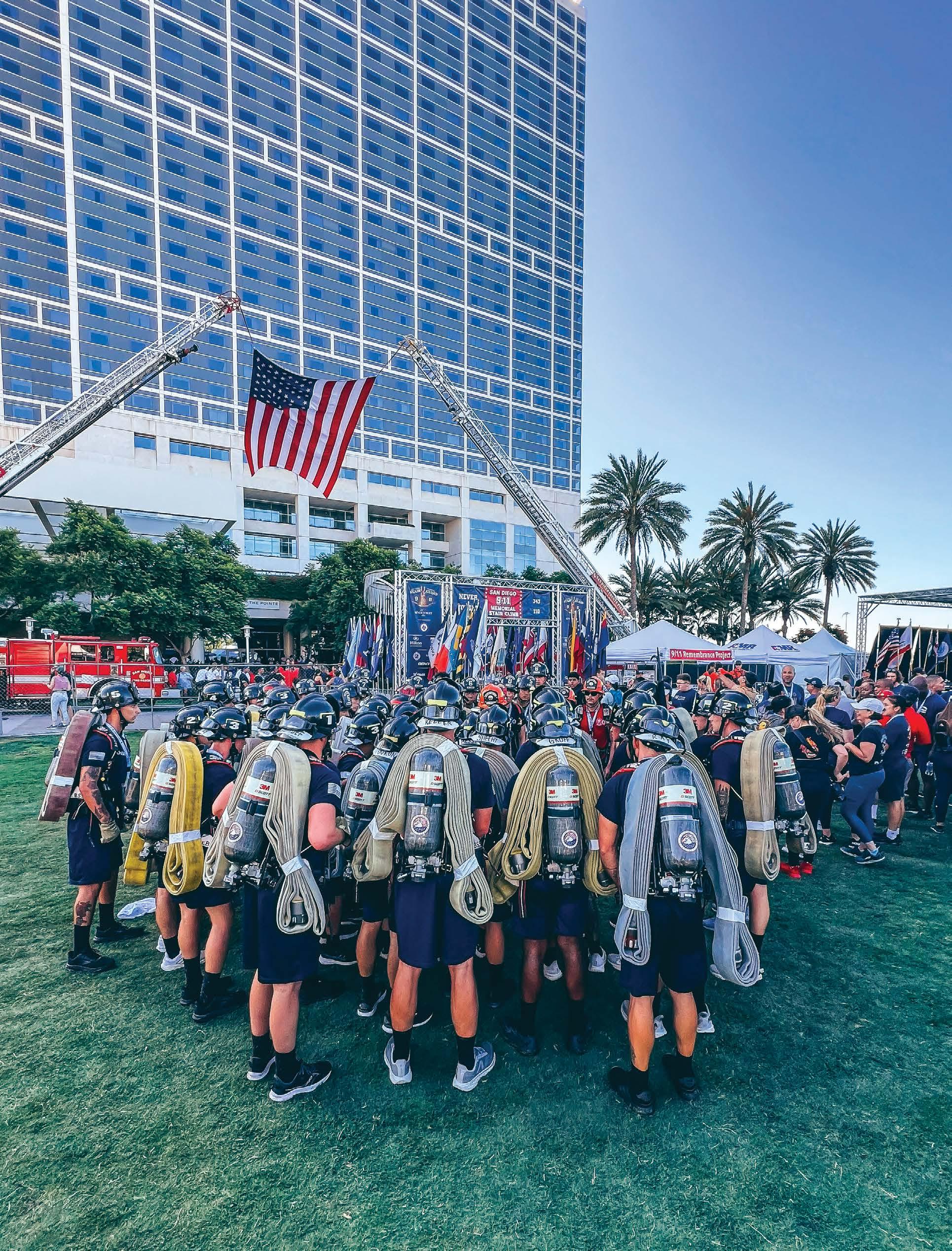
CARRYING ON
MIRAMAR COLLEGE FIRE ACADEMY 16, AND ITS INSTRUCTORS, TOOK PART IN THE 9/11 Memorial Stair Climb at the Hilton Bayfront in downtown San Diego over Labor Day weekend. The cadets climbed the equivalent of 110 stories to honor the lives lost on 9/11. The academy team was the top fundraiser of the event, bringing in more than $20,000 to support San Diego County firefighters and their families.
